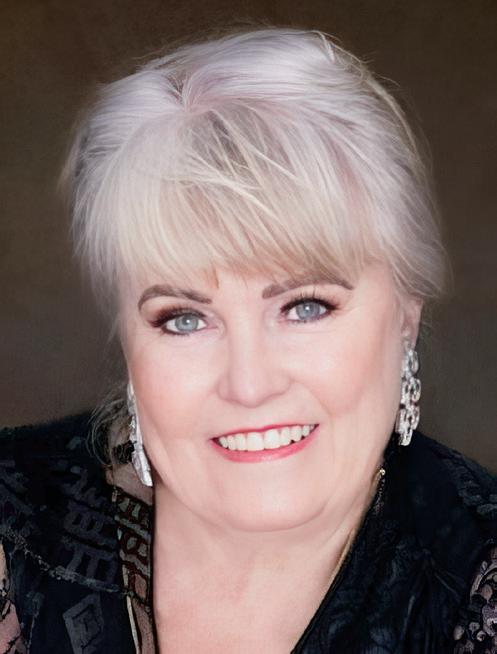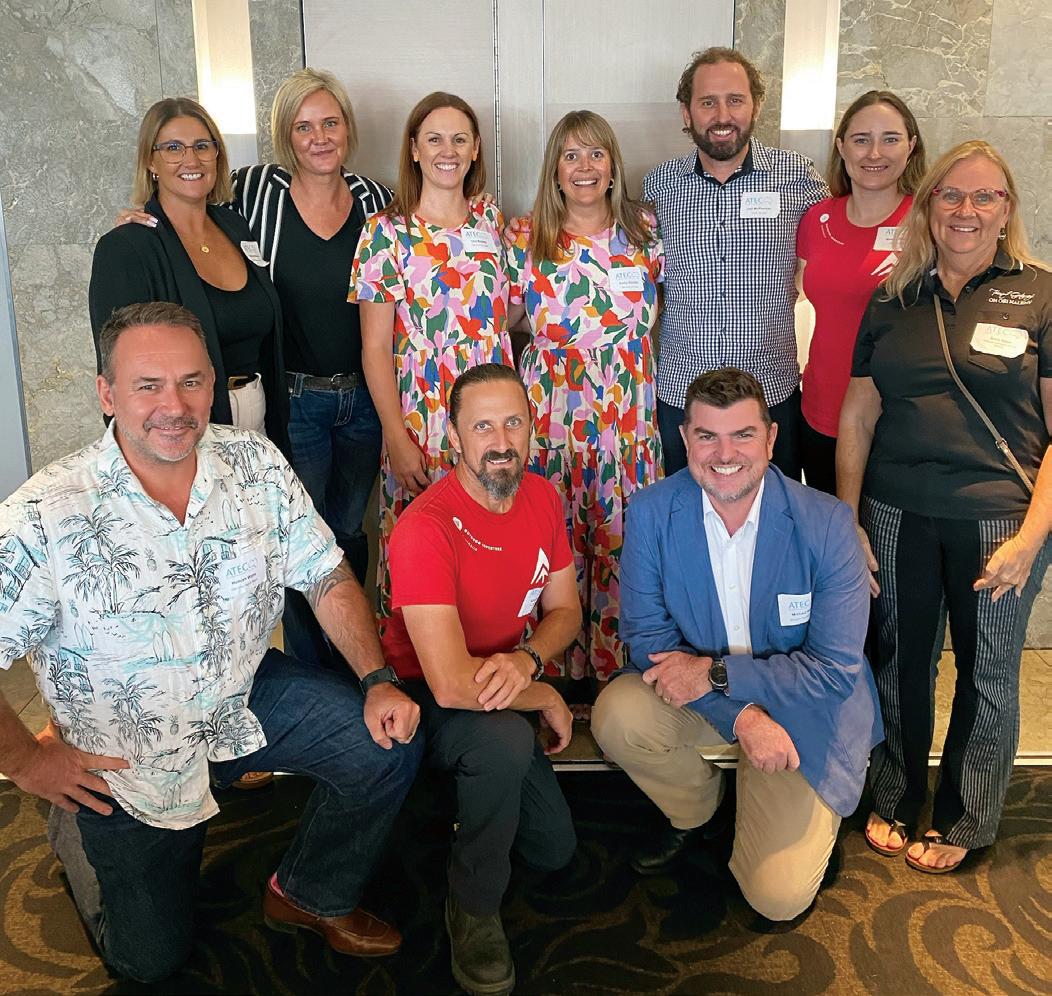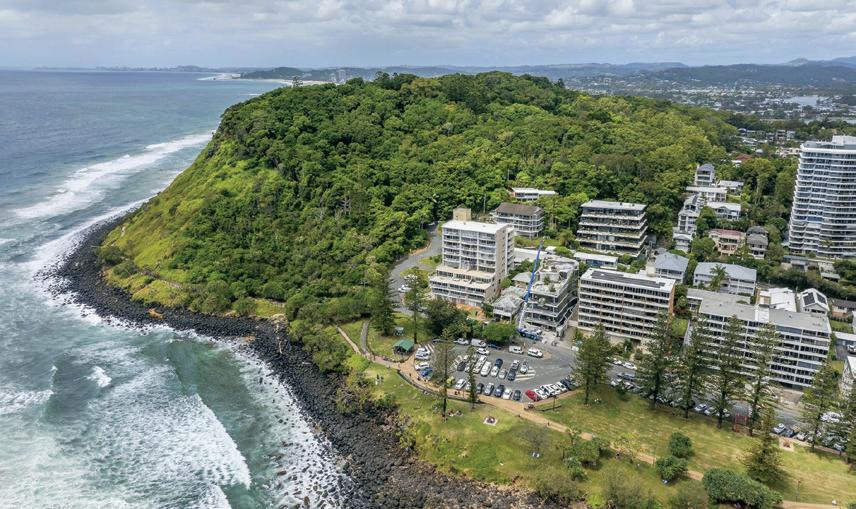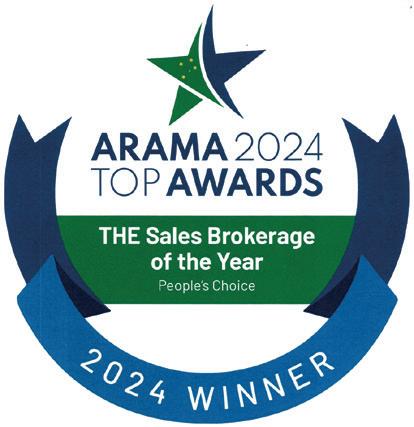



































The views and images expressed in Resort News do not necessarily refl ect the views of the publisher. The information contained in Resort News is intended to act as a guide only, the publisher, authors and editors expressly disclaim all liability for the results of action taken or not taken on the basis of information contained herein. We recommend professional advice is sought before making important business decisions.
The publisher reserves the right to refuse to publish or to republish without any explanation for such action. The publisher, it’s employees and agents will endeavour to place and reproduce advertisements as requested but takes no responsibility for omission, delay, error in transmission, production defi ciency, alteration of misplacement. The advertiser must notify the publisher of any errors as soon as they appear, otherwise the publisher accepts no responsibility for republishing such advertisements. If advertising copy does not arrive by the copy deadline the publisher reserves the right to repeat existing material.
Any mention of a product, service or supplier in editorial is not indicative of any endorsement by the author, editor or publisher. Although the publisher, editor and authors do all they can to ensure accuracy in all editorial content, readers are advised to fact check for themselves, any opinion or statement made by a reporter, editor, columnist, contributor, interviewee, supplier or any other entity involved before making judgements or decisions based on the materials contained herein.
Resort News, its publisher, editor and sta , is not responsible for and does not accept liability for any damages, defamation or other consequences (including but not limited to revenue and/ or profi t loss) claimed to have occurred as the result of anything contained within this publication, to the extent permi ed by law.






Advertisers and Advertising Agents warrant to the publisher that any advertising material placed is in no way an infringement of any copyright or other right and does not breach confi dence, is not defamatory, libellous or unlawful, does not slander title, does not contain anything obscene or indecent and does not infringe the Consumer Guarantees Act or other laws, regulations or statutes. Moreover, advertisers or advertising agents agree to indemnify the publisher and its’ agents against any claims, demands, proceedings, damages, costs including legal costs or other costs or expenses properly incurred, penalties, judgements, occasioned to the publisher in consequence of any breach of the above warranties. It is an infringement of copyright to reproduce in any way all or part of this publication without the wri en consent of the publisher.
© 2025 Multimedia Pty Ltd
As I write this, I know many of you are still picking up the pieces after the recent cyclone. These extreme weather events always bring stress and disruption, but what stands out time and time again is the resilience and dedication of our industry. To the managers who stayed calm under pressure, protected their residents, and worked tirelessly to restore order—your efforts deserve recognition, deep appreciation and reward.












Mandy Clarke, Editor editor@accomnews.com.au
First, let’s pause to reflect on the passing of John Anderson— an ARAMA Life Member and one of the true pioneers of the management and lett ing rights industry. John’s influence on our sector has been profound, and his legacy will continue to shape its future. Our thoughts are with his loved ones.






In this issue, I delve into a topic that’s unfortunately becoming far too common—scams. Running an accommodation business is already a fulltime juggling act, and cybercriminals—plus a few old-school crooks—are only adding to the pressure. To help you stay one step ahead, I spoke with industry experts, accommodation managers, and tech providers about the most frequent scams targeting our sector—and how to protect yourself. Ironically, just as I was finishing the article, I nearly fell for a scam myself. A very authentic-looking press release landed in my inbox, complete with a folder of images from a resort I recognised. It looked legitimate at first glance, but something didn’t sit right. It was unexpected, and thankfully, I paused before clicking. A timely reminder: if something feels off, it probably is. Stay sharp out there!
It was also a real pleasure to chat with Mahoneys’ brilliant property lawyer Amy O’Donnell. Amy brings sharp legal insight and a grounded perspective on the challenges facing MLR operators today. She’s one of many incredible women making waves in our industry— whether behind the front desk, in ownership roles, or leading legal and financial teams.
Finally, a litt le sunshine and inspiration—as we check in with Sonya Cooke and Robin McAdam, managers of Port Douglas Apartments, who share a wonderful story of longevity and lifestyle.
Wishing you all a happy Easter, calmer skies, and a busy holiday season!
Mandy

reading for more listings...



Experts in management rights sales
Australia’s foremost management rights sales agency, with 15 years of expertise and a dynamic team of over 15 agents strategically positioned along the vibrant expanse of the east coast, we bring unparalleled expertise and dedication to every client interaction. mrsales.com.au | 1300 928 556 Experts in accommodation sales



National coverage and expertise in the sale of motels, hotels, caravan parks, pubs & MHEs tourismbrokers.com.au | 1300 512 566 Working together, working for you



or



By Mandy Clarke, Editor
Running an accommodation business is already a challenging endeavour. Operators are required to juggle guest satisfaction, property maintenance, owners’ investments, and their own financial stability. On top of that, an age-old but increasingly insidious threat looms— fraudsters targeting the sector.
In our tech-driven society, scammers are finding ever more sophisticated ways to exploit vulnerabilities in online bookings, payment systems, and daily operations— leaving operators scrambling to protect their businesses from financial loss, operational disruption, and reputational damage.
From malicious chargeback fraud and fake bookings to phishing attacks, the threats are very real, and very costly. Resort News spoke with industry experts, accommodation managers, and technology providers to uncover the most common scams affecting the sector and most importantly, how businesses can safeguard against them.

Jill Hooper
Jill Hooper, Managing Director and Founder of Good to Book, has raised concerns about a troubling trend in the industry. “Malicious guests are exploiting the system, leaving fake reviews for properties they never stayed at, committing identity theft, and even securing chargebacks from banks, forcing properties to refund their stays in full,” she told us.
Good to Book is a members-based platform dedicated to connecting travellers with reputable accommodations, aiming for a more trustworthy booking experience for both parties. By maintaining rigorous standards and ongoing monitoring, the platform fosters transparency and reliability in the sector.
According to Jill, data from Good to Book’s reports over the past month highlight alarming patterns. Identity theft, credit card fraud, and malicious chargebacks account for 42 percent of reported cases. In 10 percent of cases,
properties were forced to issue a full refund due to chargebacks, resulting in a complete financial loss. Additionally, 26 percent of reports involved guests leaving without settling outstanding fees.
Jill attributes the rise in rogue guest behaviour to several key factors. First, a lack of guest accountability means fraudulent guests often face minimal consequences for chargebacks and unpaid fees.
Secondly, increased guest anonymity, enabled by booking platforms with little to no identity verification, makes it easier for scammers to exploit the system. The growing prevalence of instant bookings further exacerbates the issue, as automated reservations create loopholes that fraudsters are quick to take advantage of.
With fraud on the rise, Jill stresses the need for stronger verification processes, staff training to identify suspicious activity, and tighter collaboration between operators and booking platforms to bolster security protocols. Taking proactive steps now, she says, is essential to protect the industry from further loss.
However, while data-sharing can be a powerful tool in preventing fraud, it must be
handled carefully. Unless there is clear guest consent or a legal obligation, operators must not share personal guest information with other establishments. Doing so risks breaching the Privacy Act 1988, potentially resulting in serious penalties, formal complaints, and reputational damage.
Platforms like Good to Book are able to legally share certain guest information between accommodation providers because they operate under a transparent system of user consent and clearly stated terms of service. Guests who use the platform agree to these terms upon booking, allowing for secure and lawful information-sharing within a closed network of trusted providers.
Chargeback fraud—often referred to as ‘friendly fraud’—is one of the most frustrating and financially damaging scams, particularly for small business owners.
It occurs when a guest disputes a legitimate charge with their bank, falsely claiming they never authorised the transaction or that they did not receive the service they paid for. In many cases, these disputes stem from noshow bookings, misunderstandings about cancellation policies, or outright deceit. Banks have the authority to initiate chargebacks and withdraw funds from an accommodation’s trust account

when a guest disputes a transaction. The process is regulated by major card networks such as Visa and Mastercard. Banks often act in favour of guests due to strict consumer protection policies.
When a chargeback is filed, funds are automatically pulled from the accommodation provider’s merchant account and temporarily refunded to the guest.
Accommodation providers do have an opportunity to contest chargebacks by supplying evidence proving the legitimacy of the charge, including booking confirmations, signed receipts, cancellation policies, and proof of service delivery. However, if the bank sides with the guest, the chargeback is upheld, and the business permanently loses the funds.
Chargebacks don’t just impact an operator’s
Make informed booking decisions and protect your property by accessing trusted guest intel and critical incident reports from a proactive network of accommodation providers.









bottom line. They can trigger penalties from banks, increase a business’s chargeback ratio, and even result in stricter financial policies, potentially limiting the operator’s ability to process future transactions. If chargebacks become a recurring issue, payment processors may impose higher transaction fees or even refuse to do business with the property altogether.

Trevor Rawnsley, CEO, Australian Resident Accommodation Managers Association (ARAMA) confirmed that he is aware of members’ concerns about fraud, especially malicious chargebacks. However, he says in today’s world we are all vulnerable to scams—and it’s the responsibility of all of us to stay vigilant.
Integrated with your Property Management System, receive immediate notifications of potential risks during the booking process, allowing for quick, informed decisions.
Easily report issues caused by problematic guests, legally sharing the details with the network to keep others informed and protect their properties.
Access guest incident reports from other providers, giving you the intel needed to identify and prevent risks before they happen.
your property and make informed booking decisions with the support of a community of accommodation providers.
“If you’re ripped off once, shame on the scammer. If it happens again in the same way, shame on you,” he famously puts it, relating to scams that are preventable and avoidable.
He urges all members to implement and follow strict processes for handling guest transactions. Identification should always be verified to ensure it matches the credit card being used, and every step necessary should be taken to confirm the guest’s identity.
“Think of the first incident as a learning experience,” he says, “and put safeguards in place to make sure it doesn’t happen again. A thorough registration and sign-in process, along with a clear security deposit policy, are essential.”
Trevor also reminds members that having “shonky procedures” and falling victim to scams doesn’t just impact your business, it also harms unit owners. He adds that nothing sours a manager’s relationship with owners faster than preventable financial losses.
Given the manager’s responsibility to their investors, Trevor says it is crucial to implement preventive measures, respond swift ly, and have strong evidence to minimise risk.
To strengthen protection, Trevor recommends working closely with your Property Management System (PMS) provider and suggests completing the free government-backed online course, CyberWardens, which off ers practical advice on cybersecurity in the workplace. Also, the Australian Government has a scam watch and reporting link: https:// www.scamwatch.gov.au/report-a-scam
How to minimise chargeback fraud:
• Clearly communicate cancellation and refund policies to guests to avoid disputes.
• Verify guest identity at checkin and require pre-authorisation on credit cards.
• Use secure payment processing
systems and fraud detection tools to flag suspicious transactions.
• Maintain detailed transaction records, including digital checkin logs, signed agreements, and CCTV footage, to provide strong evidence in case of a dispute.
Despite these precautions, chargebacks often catch managers off guard. In many cases, by the time a manager becomes aware of a chargeback, they have already paid the unit owner. This means the manager is left to absorb the full financial loss.

Marion Simon, owneroperator of Boulevard North, describes chargebacks as “legalised theft”—a broken system that penalises hardworking management rights operators while allowing fraudulent guests to take advantage of loopholes.
“Running an accommodation business is already a delicate balancing act and a constant challenge,” she says. “Most guests are wonderful, but some are difficult, and a few are outright dishonest.”
One of the most frustrating aspects of chargeback fraud is guests who knowingly enjoy their stay but later dispute the charge—essentially stealing a free holiday, she says. But it gets worse: Marion has tracked repeat off enders, or “career chargebackers”, who systematically move from one resort to another, exploiting the system to score free stays.
She has encountered one such “serial scammer” who has targeted several businesses in Broadbeach and Surfers Paradise, successfully disputing charges and securing full refunds.
“He had the audacity to try and rebook at Boulevard North after putt ing through a chargeback that we were fortunate to win,”
she revealed. “When he tried to book for the second time, we politely told him he was not welcome. He wasn’t concerned and strutted out of the building like a peacock!
“Having proof of several malicious chargebacks makes it possible to report it to the police, however, chargebacks do not hold any major priority—the police are so busy.”
From her experience, Marion says scammers often favour same-day bookings and after-hours check-ins, hoping to bypass standard verification steps. Many also use stolen or fake credit cards, which can be difficult to detect.
Yet, banks require extensive proof to dispute chargebacks, including video footage of check-ins, signed documentation, and evidence that the guest physically presented their card, despite legally prohibiting operators from photocopying cards as proof.
To combat chargeback fraud, Marion relies on Resly, her reservations and trust accounting platform that also integrates with Good to Book.
But for Good to Book to be eff ective, operators need to report fraudulent behaviour, Marion stresses. “We must stand together as an industry to stop scammers in their tracks.”
Fake booking scams involve fraudsters using stolen credit cards to make reservations and then initiating chargebacks or cancellations. In some cases, fraudsters create fake group bookings and attempt to secure refunds through alternative payment methods, bypassing the original transaction. These fraudulent activities result in financial losses, not only from reversed transactions but also from penalties imposed by OTAs and banks.
To reduce the risk, operators should be cautious with large or unusual bookings, verifying them directly over the phone when necessary.
Implementing deposit requirements for high-value reservations can help deter scammers, while working closely with payment providers to detect and flag suspicious transactions adds an extra layer of security.
Cybercriminals frequently target accommodation businesses by sending fake emails that appear to be from hotel management, online travel agencies, or suppliers. These scams are designed to deceive staff into revealing sensitive information or authorising fraudulent transactions.
Falling victim to such schemes can result in significant financial losses, data breaches, and the exposure of guest information, damaging both revenue and reputation. To counter this growing threat, staff should be trained to recognise phishing attempts and verify requests.
Using official domain emails and multifactor authentication adds more protection, while strict protocols should be in place to ensure that payment details are never updated or shared via email.
A Queensland accommodation manager who wishes to remain anonymous shared
It’s the responsibility of all of us to stay vigilant
their stressful cyberatt ack experience with Resort News as a warning to other accommodation providers.
“It all started when one of our staff clicked on a phishing email,” they recalled. Hackers gained access, monitored keystrokes, and used the compromised email account to launch their own att ack, sending malicious emails to 5600 people worldwide.
Fortunately, Resly helped contain the breach, reset passwords, and provided templates for notifying aff ected guests. The IT team uncovered a hidden email folder where scam emails were stored to avoid detection.
The manager’s advice? “NEVER click on an email link unless you’re 100 percent sure it’s legitimate. Always check with IT first.”
Scammers often create fraudulent websites that closely resemble legitimate OTAs or hotel booking platforms, deceiving guests into making reservations that do not exist. As a result, unsuspecting travellers arrive expecting accommodation, only to discover
that their booking was never made, leading to frustration, reputational damage, and financial loss for both guests and hotels. To combat this issue, remain vigilant by routinely searching for fraudulent listings and taking immediate action when fake sites are discovered. Encouraging guests to book directly through official hotel websites helps minimise the risk, while reporting fraudulent sites to authorities and domain registrars can aid in shutt ing them down before they cause further harm.
Exploiting stolen credit cards is another common scam.
Fraudsters use stolen cards to make hotel bookings and deliberately overpay, later claiming this overpayment was an innocent mistake. Then, they request a refund via bank transfer rather than to the fraudulent credit card. Once the transaction is reversed, because the original payment was fraudulent and no funds were received, the hotel is left at a loss. This scam not only results in direct financial damage but can also lead to legal complications.

To prevent such fraud, always process refunds through the same payment method used for the original transaction, ensuring that large payments are verified before approving any refunds. Waiting for transactions to clear before issuing refunds provides extra protection and reduces the risk of falling victim to these deceptive tactics.
Some individuals threaten hotels with bad online reviews unless they receive refunds or free services. Others leave fake negative reviews to damage a competitor’s reputation.
To manage this, always monitor and professionally respond to reviews, keep a record of guest complaints to challenge fake claims and encourage satisfied guests to leave positive reviews.
In this trap, scammers impersonate suppliers, staff, or even hotel executives to request gift cards for an accommodation property. Some fraudsters use stolen credit cards to buy gift cards and resell them online.
To fight this, it is advised that you implement strict verification for gift card requests, train staff to recognise fraudulent refund requests and avoid issuing gift cards via email.
The financial impact of fraudulent activities is severe. Globally, the hospitality industry generates an estimated US$3 trillion of revenue annually. In 2022, the Association of Certified Fraud Examiners estimated that between fi ve and six percent of this annual revenue is lost to fraud. That amounts to US$150 billion in direct loss of revenue.

Managers must stay one step ahead of the trend, says Sam Steel, Co-Founder, Resly.
His key advice? “The first step is to be proactive. Perform a security review today to identify any vulnerabilities before scammers can exploit them.”
Focus on four key areas:
• Access control: “Review who has access to your systems and ensure only authorised personnel can make changes.”
• Two-Factor Authentication (2FA): “If you’re not using 2FA, implement it immediately. Adding a second layer of security makes it significantly harder for scammers to gain unauthorised access.”

• Staff awareness: “Your team is your first line of defence. Make sure they’re trained to recognise phishing scams and suspicious activity. A wellinformed staff member can prevent a security breach before it happens.”
• Incident response plan: “Have a clear, written procedure in place for dealing with scams or cyberatt acks. Make sure it’s tested and eff ective so that, if an incident occurs, your team knows exactly how to respond.”
If you’ve been scammed, act quickly to limit the damage, Sam urges. “The first step is to identify the threat— whether it’s a phishing attempt, a fraudulent booking, or a data breach.”
Once the nature of the att ack is clear, act fast!
• Contain the breach: “Shut down access to compromised systems, reset passwords, and revoke permissions for any suspicious accounts.”
• Communicate openly: “If guests or staff are aff ected, notify them immediately and provide clear instructions on any steps they should take.”
• Investigate and prevent future att acks: “Work with your IT team to determine how the breach happened and put stronger security measures in place to stop it from happening again.”
“Prevention is always better than reaction,” Sam adds. “Being proactive makes all the diff erence. Strong security measures, staff training, and a quick response plan can protect your business from unnecessary financial and reputational damage.”
The batt le against fraud requires a proactive approach.
As Jill Hooper emphasises, the data speaks for itself—fraud is rising, and operators need better tools to defend themselves.
Trevor Rawnsley, stresses the importance of accountability. While scammers are becoming more sophisticated, managers must stay vigilant and adopt stronger security measures.
Marion Simon reinforces the importance of collective action. “We need to stand together to stop scammers from draining our industry,” she says.
Ultimately, vigilance and caution must become second nature to us all. Online scammers are gett ing smarter, and dishonest people come from all walks of life, even happy holidaymakers! Learn to spot the red flags, and if something seems even slightly out of the ordinary, don’t take the risk.

When Cyclone Alfred disrupted power and communication, OPUS was fully operational, ensuring guests received the support they needed. We offered 24hour coverage and extended hours support, handled requests for critical assistance and urgent enquiries as well as normal guest contact — allowing our customers to focus on recovery. Keeping you and your guests connected when it matters the most.
100% Uptime
Uninterrupted guest support
Thousands of calls answered Including emergency requests
Seamless operational partnership During and after the storm
Extreme weather is unpredictable — guest communication shouldn’t be. Make sure you have the support your deserve.

By Trevor Rawnsley, CEO, ARAMA
After Cyclone Alfred, I found myself reflecting on the true value of being part of an association. When disaster strikes, it’s not just about dealing with the immediate impact—it’s about having the right support, guidance, and resources to rebuild and move forward.
The assistance that associations like ARAMA provide in times of crisis is invaluable, and the cyclone aftermath reinforced just how important it is to be part of a strong professional network.
Being part of a professional association isn’t just about networking events and newsletters—it’s about having a solid support system when you need it most.
I recently read a great article entitled Why Should You Join an Association?, written by Nick Koerbin, the Executive Director at Association Executive Services.
On that theme, here are six key reasons why anyone involved in management rights should join ARAMA, the association that was at the foundation of the industry and which continues to support and advocate for its members every day.
One of the greatest advantages of joining ARAMA is the immediate access to a community of like-minded professionals who understand the unique challenges of the industry. The association fosters a network of support where members share knowledge, offer guidance, and step in to help during tough times.
When TC Alfred struck, ARAMA sent out messages on the Saturday and Sunday morning to make sure all our members were okay and to ask if anyone needed assistance.
We reassured members that if they were struggling with Alfred’s assault on our coastline then we were only a phone call away.
It was the same approach we took in the great 2011 floods when buildings were inundated and some of our members were overwhelmed. Back then we mobilised our own ARAMA mud army and went out with buckets, wheelbarrows, hoses, pressure cleaners and shovels, to help clean up complexes along the river at Jindalee and in Ipswich, which had been ravaged by floodwaters.
Whether it was Alfred, Cyclone Jasper in North Queensland or any other catastrophic event, ARAMA is always there for our members.
ARAMA prides itself on delivering exceptional customer service—better service than any other association I know.
We’re available 24/7, 365 days a year because that mirrors the commitment of so many of our managers who, working in a service industry, are on call for emergencies at all times in the schemes they run. Not one of our successful members has a work-to-rule approach.

They’re mopping up the basement car park until the job is done—probably doing the same work at 11 pm as they were at 10 am, if that’s what’s needed. They respond to whatever happens.
At ARAMA, we provide that same level of service for our members. We’re always available for you.
One of the great benefits of this association is the camaraderie among resident managers, most of whom are more than happy to offer advice or assistance— even to other managers who might be their business rivals.
Whether it’s navigating tricky body corporate issues, dealing with unexpected building repairs, or simply needing advice from someone who’s been in your shoes, ARAMA members benefit from a peerdriven support system that ensures they’re never alone.
ARAMA provides enormous amounts of information to help members deal with any situation.
Our member resource library is designed to be a go-to platform for all the information
and forms you might need as an MLR operator.
We also provide a member discussion forum to connect members in real time and it can be used for business questions, referrals and to seek assistance from like-minded members.
Members have exclusive access to our online help section and member discussion forum, where real people give real answers.
This can help members better navigate new regulations, industry trends, and best practices. We also send out regular newsletters and host webinars to provide members with the best possible information for their business.
In the wake of TC Alfred, we hosted a webinar outlining critical steps for rebuilding and accessing financial assistance.
ARAMA also created a dedicated page for Alfred on our members’ discussion forum, along with a folder in our resource library containing information on the government assistance available to MLR businesses.
The value of strong industry advocacy cannot be overstated.
Without ARAMA, many MLR businesses would be operating under three-year agreements instead of the much longer terms that exist today. Through active engagement with government agencies, regulatory bodies, and stakeholders, ARAMA ensures the voices of its members are heard and that their interests are protected.
ARAMA has been fighting for the rights of its members since our inception more than 30 years ago, and there certainly wouldn’t be an MLR industry as we know it without ARAMA.
Advocacy is the foundation for ARAMA’s work.
Associations act as a unified voice, representing the interests of their members to government bodies, regulatory agencies, and other stakeholders.
Governments prefer to deal with—and in some cases will only deal with—industry associations. If there were no ARAMA, there would be no one in the industry for them to turn to for advice or input into legislation affecting management rights.
I sit on several committees and am currently working with the Office of Fair Trading to approve subjects for compulsory professional development for licensees, which begins in June. If the Office of Fair Trading didn’t consult ARAMA on this matter, it’s quite likely the subjects would be irrelevant to the business of management rights—and therefore ineffective.
ARAMA acts as a conduit for information to and from governments.
When new legislation is debated, governments recognise that ARAMA represents a large and important industry. For example, when the Queensland Government discusses tourism, they hear from the MLR industry, which manages around 25 percent of the state’s tourism beds. If ARAMA wasn’t there to advocate for members, our industry would be more heavily influenced by other groups representing industries such as caravans, motels and backpacker accommodation.
Government grants and support programmes can be a lifeline for businesses but navigating them can be complex. ARAMA helps members identify and access available funding, ensuring they get the assistance they need when unexpected challenges arise.
After any disaster situation, ARAMA will provide the necessary information in a timely way and the help in accessing the grants.
ARAMA has previously advocated for our industry to be included in tourism funding after a bureaucrat in Canberra argued that Federal Government assistance didn’t cover MLR on the grounds that it was more about real estate than tourism.
I met face-to-face with the then Queensland Tourism Minister, Michael Healy, and pointed out that companies such as Oaks, Quest, and 3000 other small business operators providing tourist accommodation in the MLR sphere would argue strongly that they are part of the tourism industry.
In fact, of the 38 tourist buildings in Port Douglas, 36 of them are ARAMA members.
ARAMA offers a range of educational programmes, including workshops, conferences, and opportunities with business mentors, which are all designed to help managers develop new skills, and move with the times in an ever-changing industry.
We run around 40 events each year, and the members who attend always benefit. They’ve invested significantly in their businesses, and our training courses—most of which are free—help them maximise the return on that investment.
By actively participating in ARAMA, members contribute to the growth and sustainability of the whole MLR industry.
We see this every year when our TOP Awards recognise the best of the best in our industry. These annual awards are an
opportunity to showcase excellence and encourage everyone in the industry to strive for similar results.
TOP Award winner Nicole Morris, from the Azure Sea Resort in Airlie Beach, says only the support of ARAMA got her and husband Stuart through the first few difficult months of their tenure as managers when they took over a rundown complex in December 2022 and realised they had many steep obstacles in front of them.
ARAMA was their saviour.
ARAMA encourages members to connect, share experiences and collaborate. Our networking events, online forums, and special interest groups enable members to build valuable relationships, exchange ideas, and explore potential partnerships.
Collaboration provides information and support, and if you’re not involved with other ARAMA members you’re simply missing out on their wisdom and experience.
Smart operators in MLR go out of their way to meet with other people in the industry.
A lot of managers on the Sunshine Coast, for example, meet at the Marcoola Surf Club for lunch and a schooner to chat about their businesses and offer each other social support. These gatherings can even help identify managers who may be in need of a helping hand.
Being part of ARAMA isn’t just about paying dues—it’s about being part of a collective strength that advocates, educates, and supports. In an industry where challenges are inevitable, having a network of peers, access to critical information, and the backing of a powerful advocacy group makes all the difference.
For those in management rights, joining ARAMA isn’t just an option—it’s an investment in a stronger, more resilient future. If you’re not already a member, now is the time to get involved and make the most of the many benefits that come with being part of a professional association.











By Jane Wilson, Commissioner for Body Corporate and Community Management
Conciliation is the first formal step to resolving a dispute and it’s also one of the services offered by the Office of the Commissioner for Body Corporate and Community Management (BCCM).
Most people applying to have a dispute resolved through us will need to participate in conciliation before adjudication, which is the second formal step in the dispute process, can occur.
Both conciliations and adjudications are only available for those who have previously attempted to resolve the dispute with the other party (or parties) named in the application.
An application for conciliation and an adjudication must include evidence showing attempts to resolve their dispute.
This article will cover some frequent questions about seeking a resolution and provide real case examples of disputes resolved through conciliation.
With the guidance of a conciliator, the applicant and respondent (parties to a dispute) can engage in constructive discussions and receive relevant information on the applicable body corporate legislation.
This will assist in reaching an informed and mutually agreed-upon outcome.
Conciliation off ers a variety of benefi ts that make it an efficient choice for dispute resolution:
• Cost-eff ective: A one-off fee covers a three-hour session led by a conciliator, making it an aff ordable way to address and resolve disputes. In addition, each party discusses their issues with the conciliator before meeting the other party.
• Efficient turnaround: When applications meet legislative requirements, sessions are scheduled within three to four weeks, providing a fast pathway to resolution. This allows for issues to be addressed promptly while reducing prolonged uncertainty.
• Mutual agreements: Conciliation encourages open communication and empowers all parties to contribute to the outcome. Reaching a mutually accepted resolution helps resolve the immediate issue and supports ongoing positive relationships, making it especially beneficial for living in a body corporate.
• Informal process: The process is without legal representation. This creates a comfortable sett ing where participants can discuss their concerns. Conciliation is your chance to have control of the outcome of the dispute.
• Convenience and accessibility: Sessions are conducted over the phone, allowing parties to participate from any location.
• Knowledgeable conciliators: Conciliators provide insights into how legislation applies to the dispute, ensuring parties receive the required information to make decisions. Conciliators may suggest relevant adjudication orders be read.
Conciliators facilitate constructive discussions between the parties. They guide everyone through each step of the process and provide information about relevant legislation and at all times remain neutral and do not advocate on behalf of either party. Instead, they help maintain a balanced discussion, encouraging each party to share their perspective and work together towards a mutually acceptable solution.
Before the scheduled session, the conciliator contacts all parties to explain the process and answer any questions.
This preparation fosters a smoother, more productive session where all parties feel informed and ready to engage in meaningful discussions.
All parties are encouraged to join the session with a genuine willingness to reach a solution. To ensure a productive discussion, the conciliator may set a few ground rules, such as:
• Listening without interruptions.
• Keeping discussions respectful and constructive.
• Not allowing sessions to be recorded.
The conciliator may end the session if ground rules are broken.
We highly encourage the parties to attend the session with an open mind, participate willingly in the discussions and be prepared to off er solutions to resolve the issue.
Generally, only the parties directly involved in the dispute (the applicant and respondent) attend the conciliation session.
However, if another person is aff ected by the issues raised, and is named in the application, the conciliator may invite them to participate.
You can request a support person for comfort, but they generally do not speak during the session.
Legal representation is typically not allowed in conciliation, as it is a non-adversarial process. Body corporate managers are also usually not involved.
Conciliators will ensure everyone can participate fully in the process.
If there are any adjustments required to accommodate someone’s needs, conciliators must be informed ahead of time.
If requested at least 24 hours before the scheduled session, our office can arrange interpreters if needed.
Conciliation sessions aim for timely resolution. However, if you cannot attend on the scheduled date, you can request a reschedule by contacting the conciliator and explaining your reasons.
The conciliator will consider each request individually, with flexibility around unforeseen issues like medical emergencies or unique circumstances.
All parties are encouraged to make a genuine eff ort to participate in conciliation. However, failing to attend without a reasonable cause may lead to the conciliator closing the application and issuing a certificate stating no reasonable attempt was made to participate.
This may aff ect an applicant’s lodgement of an adjudication application with our office, and the respondent may be ordered, in a subsequent proceeding, to pay for the conciliation and adjudication application fees.
Before Skye bought her townhouse in Cairns, she researched the body corporate by-laws for community titles scheme.
By-law 11 was a permissive by-law that allowed pets

onto scheme land with body corporate approval.
Skye applied to the body corporate (BCCM Form 31), asking for her six-year-old labradoodle Cookie to be approved to live on the scheme.
She included registration details and a photo of Cookie. The committee considered her application and decided not to approve the labradoodle.
The application was denied with a two-to-three split vote against the motion.
After further attempts to communicate with the body corporate, but not receiving a response, Skye decided to lodge a conciliation application with the BCCM office.
Once Skye’s application met the requirements of the legislation, the matter was scheduled for a conciliation session.
A copy of the application was sent to the body corporate and Jacob and Lillian, two voting committee members, were authorised to represent the committee at the session.
At the session: The conciliator


contacted all parties before the session and provided information about the legislation and similar previous adjudicator’s orders.
Jacob and Lillian outlined the reasons for the body corporate declining Skye’s application. They believed Cookie would be a nuisance and would roam on common property and bark. At the session, the conciliator was able to give all parties information about their obligations and provisions of the legislation.
Skye was able to reassure the committee that Cookie was well-behaved, and as the pet owner, Skye would comply with reasonable conditions imposed as part of any approval.
The agreement was to allow Cookie to come onto the scheme under the following conditions, which would mitigate concerns:
• The animal must not cause a nuisance or interfere unreasonably with any person’s use or enjoyment of another lot or common property.
• The animal must be on a lead or adequately
restrained while on common property.
The agreement was signed by all parties who participated in the conciliation session.
Committee members must be authorised by the majority of the committee to make decisions that would reasonably be expected at a conciliation session.
This scenario demonstrates that even when you think you have followed all the requirements of the legislation and by-laws, disputes can still arise.
Participating in the session gives the parties a better understanding of the legislation and a better understanding of each other, through communicating their perspective in a civilised manner.
Hopefully, this article has answered your questions about the conciliation process and provided an understanding that even if something seems impossible or has simply been voted against, a positive outcome for both parties can be achieved with the assistance of a trained professional.




































By Ben Ashworth, Senior Associate, Small Myers Hughes Lawyers
A common dilemma that managers face when operating a management rights business is that sooner or later, the manager needs to ask the body corporate for something. That something might be a raise in their remuneration, an extension of their agreements, a change in the caretaking duties, or some other matter that is contentious.
Whatever the “something” is, be assured that there will be owners in the body corporate that will not want to give the manager what they are seeking.
The fact that individual owners or the body corporate have the ability to deny the manager something they want or even need for their business can come as a shock for some managers. On a number of occasions I’ve heard managers say words like, “but I paid a lot of money for this business, they owe me.”
The reality is that, yes, a lot of money was paid for the business, but, it wasn’t paid to the members of the body corporate. The body corporate doesn’t owe the manager anything that isn’t already written in the caretaking and lett ing agreements. Furthermore, owners generally hold the view that the manager actually owes them. The common perception for owners is that they pay ever increasing levies for the manager’s services and as the manager’s remuneration goes up the owners expect more in return (whether justified or not).


How a manager approaches the body corporate and starts a conversation with owners about something the manager wants from the body corporate is crucial. It sets the tone for all that follows and can get the ball rolling towards a favourable or unfavourable outcome. This is a situation where first impressions do matter.
Regardless of what the manager is asking for, it will do significant damage to the manager’s relationship with the body corporate if the manager disregards how easily a body corporate can deny their requests. A manager who acts in a way that expects owners to protect the manager’s investment in their management rights business is forgett ing that it is not the responsibility of the owners to do that. It is up to the manager alone to remove or reduce the risks associated with operating their management rights business. Ideally, before approaching the body corporate with any request that might be considered contentious, a manager will already have brainstormed how their request will be
viewed from the eyes of the owners. A savvy manager will put themselves in the shoes of the owners and ponder the obvious question that owners will ask, “what’s in it for me?”
Then (hopefully with a clever answer to that question plus others in their pocket) the savvy manager will then consider what the best way is to communicate their request with the owners, and do exactly that. They will also keep their emotions in check and not act surprised if it turns out that the body corporate is not immediately on board with all their demands and doesn’t immediately do everything they have been asked.
It’s not the end of the world, it just means you have other problems to deal with tomorrow. At least one of the problems won’t be owners reacting poorly to a claim that they owe you because you paid a lot of money for the business.
Liability limited by a scheme approved under Professional Standards Legislation.
Disclaimer: This article is provided for information purposes only and should not be regarded as legal advice.

Are you managing a resort or apartment complex struggling with slow, unreliable internet? It’s time to upgrade to a worldclass connectivity solution that enhances guest satisfaction and maximises your return on investment.
We partner with resorts and apartment complexes that:
Need to eliminate poor internet performance and transition to high-speed, private fibre connectivity.
Have forward-thinking management that values long-term upgrades and cost-e cient solutions.
Want to reduce costs per apartment while benefi ing from economies of scale with low CAPEX investment into enterprise grade networks (not NBN).
Desire ultra-fast speeds of 100-300 Mbps per apartment, backed by real success stories and testimonials.
Seek to optimise existing infrastructure and leverage the latest WiFi technologies, including the path to WiFi 6
Aim for higher guest reviews, strong word-of-mouth referrals, and repeat bookings by o ering seamless connectivity.
As digital demands rise, we are commi ed to cutting-edge innovation that ensures top-tier connectivity for resorts and apartment complexes. Our private fibre solutions deliver:
Ultra-fast speeds with low latency for seamless streaming, remote work, and smart home integrations.
The latest WiFi technologies, ensuring strong coverage across all apartments.
99.95% service level guarantees for reliable, uninterrupted internet performance.
Upgrade today and join a network of satisfied resorts enjoying premium connectivity. Let’s make your internet a selling point, not a problem!



…with the flick of a switch our internet services moved to world class Gigabit capable internet. Resident and guest satisfaction has skyrocketed with the availability of fast, reliable industry leading internet, which allows our resort to include phone, video and streaming services never before offered. Absolutely Brilliant!”
– Eric van Meurs, Manager Atlantis Marcoola Beachfront Resort and past ARAMA President (Australian Resident Accommodation Managers Association.)






By Grantlee Kieza OAM, Industry Reporter
In the calm after the storm, Resort News caught up with highly respected property lawyer Amy O’Donnell as she ran through Brisbane’s northern suburbs, relieved that her neighbourhood had escaped the worst of ExTropical Cyclone Alfred.
Amy plays competitive hockey to stay fit and runs three or four times a week to clear her head from the stresses of her high-powered role as a partner at Mahoneys Lawyers.
Much of her 28-year legal career has been spent helping clients navigate the oftenstormy waters of management rights transactions, steering them toward a safe direction. She prides herself on being a calming beacon during
what can be a period of great upheaval for new buyers and their families entering the management rights industry.
Born and raised in Brisbane’s Springwood-Logan area, Amy moved across the bridge after marrying and is now the mother of two children, both on the brink of their own careers.
She completed a double degree in law and accounting at Queensland University of Technology’s Gardens Point
campus before beginning her journey in property law.
“I started my articles in 1997 and was admitted in 1999,” Amy says.
“My first job was at Hillhouse Burrough McKeown, which was heavily involved in motel leasing, so that became my area of practice—leasing and other property matters. In 1999, they had an opportunity to acquire a management rights practice, and I put my hand up to learn the industry. While it was
similar to the motel industry, it was still very diff erent.
“ResortBrokers and some of the other agents were the same players in management rights back then, and that’s how I found my way into this space. Here we are, all these years later.”
Amy remained at Hillhouse until 2004 before moving to Hynes Legal. She joined Mahoneys Lawyers in 2020 and soon became a partner.
She holds a Bachelor of Laws, a Master of Laws, and a Bachelor of Business and is admitted to practice in Queensland and New South Wales. Her specialties include management rights, motels and hotels, business transactions, commercial and retail shop leasing, and commercial property acquisitions.
With nearly three decades in property law, Amy stresses the importance of expert legal advice for anyone considering a management and lett ing rights business.
“There are a lot of laws pertaining to management rights that you only fully understand through industry experience,” she says.
“It’s very much a people business as well. A big part of my job is managing people, expectations, and bodies corporate. Having a lawyer who understands how these processes should unfold and knows how to press the right buttons is essential.
“These transactions require a lot of management. If you let them roll, they can take even longer than they already do. At present, most management rights transactions take around four to six months, and unnecessary delays can complicate matters further.”
Amy emphasises the unique aspects of management rights law that only seasoned property lawyers grasp.
“A buyer is not just purchasing a unit but also a business, making it a very diff erent transaction from other property sales,” she says.
“While some management rights deals share similarities, no two properties or transactions are exactly the same.”
She is pleased that female lawyers are gaining prominence in this space and sees a strong connection between her role as a mother and her work
For Amy, the dynamic nature of the management rights industry is what keeps her work interesting.
“Every transaction and business is unique,” she says.
“Each one involves diff erent owners, committees, and facilities. These days, committees take a greater interest in who manages complexes, which is a good thing. However, it means that in any management rights transaction, a lawyer must navigate multiple personalities to ensure a smooth process.
“It’s a people business, and success in this industry comes down to your ability to work with people.”
Amy was recognised for Real Property Law in the 2023 and 2024 editions of Best Lawyers in Australia. She admits she doesn’t know exactly how the honour was decided but was delighted nonetheless.
“I know it’s a peer-reviewed nomination, meaning other lawyers vote on it,” she says.
“It’s wonderful to be recognised that way, especially since it comes from within the industry.
“I take a more commercial approach to my practice than some others might. I focus on understanding where all parties are coming from and how everyone can achieve their goals, rather than pursuing wins at someone else’s expense.
“I think that mindset has contributed to my recognition in the field.”
Amy’s key service areas in the management rights industry include acquisitions and sales, off-the-plan transactions, and
advising bodies corporate, lot owners, building managers, and body corporate managers on Queensland’s strata legislation. She reviews and draft s variations to management rights agreements, assists with contract negotiations, and advises clients on their legal obligations under the Property Occupations Act.
She is also an active member of the Australian Resident Accommodation Managers Association (ARAMA), frequently presenting at industry events and representing ARAMA in the Residential Tenancies Authority (RTA) stakeholder forums.
“ARAMA plays a vital role in supporting its members through every aspect of their business,” Amy says.
“It is incredibly important to have an industry body advocating at various government levels. ARAMA does a lot of work behind the scenes, keeping track of legislative changes and protecting the interests of management rights operators.
“They have successfully lobbied against legislation changes that could have been detrimental to the industry, and they’ve been instrumental in safeguarding management rights businesses for years.”
Away from the office, Amy enjoys family holidays and sports.
Although she has scaled back her distances, she still runs three or four times a week, usually 5km, and continues to play competitive hockey.
“Running helps me relax and clear my mind,” she says.
“And I love playing hockey. I got into it through my daughter. She’s in Year 11 now, and my son is in his second year at university studying IT.”
Family holidays are always a special time and ski trips are a highlight.
“Our great passion is skiing,” she says.
“We recently went to Japan, and it was fantastic. Japan is an incredible place, and I highly recommend it.”
Amy believes female practitioners play a crucial role in the accommodation industry. Women often manage front-office operations at management and lett ing rights properties, making their contributions essential.
She is pleased that female lawyers are gaining prominence in this space and sees a strong connection between her role as a mother and her work helping clients navigate management rights transactions.
“Many of my clients are relocating their families, moving schools, and buying a business—some of the most stressful things a person can do all at once,” she says.
“Empathy is key in helping them transition smoothly. The process can be frustrating, with many delays beyond their control.
“You must show a lot of patience during these transactions.
“Some people have said I take things too personally when I’m working for clients but that’s how I’m wired. I try to help them achieve their goals with as litt le stress as possible.”
By Will Kenny & Matthew Manz , Mahoneys
As any resident manager will tell you, operating a building complex can be extremely demanding. In larger buildings— especially those focused on holiday or short-term letting—managers often work seven days a week, leaving little opportunity to take extended holidays.
So, when it’s finally time for a break, what should you consider? How long can you be away? When is the best time to go, and who will look after the building while you’re gone?
As most readers will know, resident managers are, in almost all cases, not employees and therefore do not have access to leave entitlements under the Fair Work Act. Furthermore, the Body Corporate and Community Management Act and its associated Modules are silent on the matter.
That being the case, the manager’s ability to take holidays is completely and utterly dependent on the wording of their caretaking and letting agreements. It is vitally important to be aware of what your obligations are where leave is taken, as any non-compliance could put you in breach of your agreements.
In most circumstances, caretaking and letting agreements will allow managers to take leave up to four weeks per year, usually on the condition that the manager appoints a suitable replacement during their absence. Such a replacement must have the requisite skills and experience to perform the manager’s duties, and more often than not, be approved by the committee. It is important to understand whether your agreements require you to give notice to, and or obtain approval from, the committee prior to taking leave, and if

a shorter period of notice is permitted in the event of urgent or emergency circumstances.
If your agreements do not contain a leave provision, you need to look at whether your duties may be performed by any delegate of the manager with or without the need for consent. Other considerations include whether there must be an approved nominee in place (which is important if the person taking leave is a nominee), and if your agreements require someone to reside on site.
On a practical level, if there is no requirement in your agreements for a replacement to be approved, or if the duties can be performed by any delegate, you should ensure that any staff or sub-contractors are competent enough to perform the duties in your absence. Your committee should also be kept well informed of what your leave arrangements are and if any replacements have been appointed in your absence. While it goes without saying, you should ensure regular contact with your staff or subcontractors while leave is taken.
From a letting perspective, the Property Occupations Act 2014 (Qld) (POA), contains provision for licensees to take leave. There are certain requirements for each type of
leave which also differ if you are an individual or corporate licensee. The Act provides that licensees may take leave for periods less than 30 days, and in excess of 30 days. If you are an individual licensee taking leave for a period up to 30 days, you can appoint an unlicensed substitute, provided that the appointment of the substitute and the substitute’s consent is in writing and states the period of appointment, the substitute is covered under the individual licensee’s insurance (if it is a requirement of the licence to hold insurance), and all such information is kept in the licensee’s registered office available for inspection.
For corporate licensees, a licensed director or person in charge can be replaced by an unlicensed person if there is no other licenced person in the company available to replace. This is on the condition that the same requirements above are met, except for the insurance obligation. It is important to note that these provisions do not cover a situation where a licenced person is absent due to resignation or termination of employment. For leave in excess of 30 days, an application must be made to the chief executive of the Office of Fair Trading, with the substitute’s signed consent to the appointment along with
other supporting information. There are severe penalties for failure to comply with the legislative provisions of the POA or to carry out the steps prescribed. The leave entitlements under the Act are also subject to any restrictions on leave in your agreements. In summary, if you are contemplating taking leave it is important to make sure you consider the following before making any arrangements:
• What do your agreements permit (if anything) for taking leave?
• If there is provision for leave, what are the notices requirements and conditions on appointing a replacement?
• If there is no provision for leave, can your duties be performed by any delegate without consent? In any event, it is prudent to give the committee as much notice as possible of your leave and details of any replacements irrespective of whether there is need for body corporate consent.
• Consider any requirement under the POA depending on which license you hold and the length of leave you are taking.

By Andrew Morgan, Motel Broker/Partner, Qld Tourism & Hospitality Brokers
A new owner or operator of any business—or even a home, for that matter— often brings a renewed sense of enthusiasm. There’s usually a desire to improve something, work hard at it, or simply change it for the sake of making it their own. The same can be said for many aspects of life: switching clubs or teams in sport, changing jobs, or receiving a promotion. Whenever we embark on something new, we tend to start strong, but over time, the novelty wears off—sometimes quickly, sometimes gradually. Unless you’re truly committed, it can be difficult to maintain that initial level of intensity.
Immediately after purchasing a business or, more specifically, a motel, it is expected that the new owner or manager will be keen to stamp their mark on the business and work hard to improve it. As the old saying goes, no one ever buys a business without intending to improve it. This most likely means long hours and a desire to build Rome in a day.
But over time, it’s human nature for motivation to decrease or fade. This can be a natural progression or driven by changing circumstances, such as health issues, relationship changes, or any number of life factors.
As a result, we may not work as hard as we did in the beginning and make adjustments to accommodate this. That

might involve appointing a manager to run the business or hiring additional employees to take up the slack.
Everyone is different, and for some people, working hard until they cannot physically or mentally do it anymore, is just part of their make up. Others, when they know they have had enough, may be more inclined to get out or make a change. Then there are those somewhere in between that find a happy balance and work within that.
The first type of person may never (or rarely) take a holiday to recharge, and that is fine for them. Others may take many holidays and are happy to retire as soon as possible. Then some balance work and time off and can recharge and continue merrily along.
It’s not easy to put on a smile during difficult times; however, running a service-based business often requires it. If guests are frequently not greeted with a smile, it may be a
sign that it’s time for a change. Recognising this is undoubtedly the hardest part—but once acknowledged, it becomes time to reassess the situation and consider the path forward.
Businesses are bought and sold every day, and there are numerous reasons why any business is offered for sale to the market. It can be due to retirement, upscaling, downsizing, simplifying life, taking a capital gain, tiredness, burnout, changes in circumstances, health issues, and more. Often, the reason is exhaustion. The business owner needs a break and has lost the enthusiasm to do those little extra things they once did. In a perfect world, preparing for sale needed to be considered well before now, not once the mindset has changed and moved on. The best financial decisionmaking position is when things are calm and not when they are based on highly emotive reasons or forced positions.
Excluding the occasional customer, motels have a fairly regular timetable of activity. Busy until mid-morning or even lunchtime, a lull during the middle of the day and they ramp up again for check-ins later in the day.
Utilising any downtime where possible is a good way to manage time and energy. Working yourself into the ground to try and save a dollar here or there is commonplace, but it can’t be maintained long term. Those who operate their motel business and manage a lifestyle can comfortably operate the same motel for decades. Longevity such as this, in any business means they are doing something right and have a good work/ lifestyle balance that suits them.
From a planning and management perspective, having a length of tenure goal is a great idea; however not always easy to achieve. Some may reach the goal and extend well beyond. Others may choose to opt out much sooner. Either way making that decision at the right or appropriate time is the key.
Having a strategy to prepare to take any business to the market is the ideal way to approach things. Many future sellers contact their broker at least a few months in advance of wanting to go to the market. The discussions should include what needs to be prepared, if any processes or operational matters need to be changed or fixed, allowing time for all involved to have the correct information and data ready to attract genuine buyer interest. Deciding one day to sell and wanting it to be offered to the market the next is not ideal. It is the case of getting the initial process right rather than just shooting from the hip.
Not being in a position of “must sell” will assist in achieving the best result. Selling at the right time, when not under pressure, makes the sale process less stressful. If the seller is happy and the buyer is happy, it’s a win-win situation!
















By Lel Parnis, Holmans
Tropical Cyclone Alfred has wreaked havoc on the accommodation sector, causing significant financial strains.
The immediate impact is predominantly in South East Queensland and North East NSW, but with airport closures and the media coverage of anticipated damage meant businesses were impacted far outside the most affected areas.
Cyclone Alfred’s impact is most evident in the substantial reduction of income for leisure properties in March 2025. Given the unprecedented nature of such events (the last comparable event being Cyclone Wanda in 1974), it should be treated as a one-off occurrence. Similar to the approach taken during the COVID-19 pandemic, it may be appropriate to normalise income for March 2025 for sales or valuation purposes.
A typical method would involve replacing the actual income for March 2025 with the average income for March 2024 and 2023. Additionally, any oneoff cancellation fee income generated should be removed from these calculations. Retaining reports showing the actual level of bookings just before cancellations began, compared to the same period in the previous year, is crucial. This report is known as a PACE
Report, and if your current software cannot generate it, an upgrade may be necessary.
Other immediate financial repercussions that necessitate careful consideration and meticulous accounting and documentation include: emergency expenses (immediate costs for emergency repairs, temporary relocation of staff or guests, and procuring essential supplies); asset impairment (calculation of the diminished value of damaged assets, including buildings, furniture, and equipment); and insurance claims (documentation of damages, including photographic evidence and detailed invoices, is crucial for maximising recovery). It is essential to ensure your record-keeping can support disaster-related deductions and claims for recovery payouts.
The importance of having access to recovery resources for small businesses has been highlighted in the aftermath of Cyclone Alfred. Some key resources available to support recovery efforts include government grants and Disaster Recovery Funding Arrangements (DRFA). On an individual level, the Queensland Government Emergency Hardship Grant is available for individuals in eligible areas, providing $180 per person and $900 for families of five or more. The Federal Disaster Recovery Allowance is for individuals unable to work due to Cyclone Alfred and offers payments up to the maximum Jobseeker rate of $1000 per fortnight. Eligibility details can be found on the Services Australia website, and it is important to note that the amounts received are taxable.
Assistance available to affected small businesses in South East Queensland includes access to concessional recovery loans. Disaster Assistance (Small Business) Loans provide concessional interest rate loans of up to $250,000 to assist businesses whose assets have been significantly damaged to recover and return to viable operations and will
cover the repair or replacement of damaged equipment and infrastructure, and restocking.
The Disaster Assistance (Essential Working Capital) Loans Scheme for Small Business provides concessional interest rate loans up to $100,000 to help those that have suffered a significant loss of income by providing essential working capital required to continue business operations, including paying salaries or wages, creditors, rent or rates.
The Australian Taxation Office (ATO) also offers natural disaster support, including stopping correspondence to people in affected areas during major disasters. Once the crisis has passed, the ATO can assist in getting businesses back on track. Depending on your situation, the ATO may be able to:
• Give you extra time to pay tax or lodge tax returns, activity statements, or other obligations.
• Set up a payment plan tailored to your individual situation.
• Remit penalties or interest charged during the affected period.
Your accountant can help coordinate the above and advise on the tax consequences of insurance payouts, repairs, improvements, and other related matters during the recovery period.
In the aftermath of Cyclone Alfred, business owners should be proactive in reviewing financial strategies and potentially leveraging available government assistance to mitigate the impact on their businesses. By normalising income, ensuring costs are adequately documented, seeking government grants, and utilising ATO support, businesses can navigate the challenges and work towards recovery.
By Chris de Closey, Director, Switch Hotel Solutions
The recent lash of Cyclone Alfred across Queensland has reminded us how our industry is susceptible to nature and its wildness from time to time. It’s also reiterated the importance of preparedness and resilience in the hospitality sector.
In our space, we have the added challenge of ensuring guest safety, protecting our owners’ investment properties and ensuring our business comes out as unscathed as possible. In any emergency event, we need to ensure that we take steps to be best prepared for the impending event.
Risk assessment and insurance review: Begin with a thorough risk assessment specific to weather-related threats. Ensure that your insurance coverage adequately protects against such disasters, covering not only property damage but also business interruption (this one proves a bit harder sometimes!). This includes removing items from balconies, and ensuring gardens are cleaned.
Communication plan: Develop a clear communication strategy that includes notifying guests, staff, and owners efficiently. Utilise multiple channels—email, SMS, social media and your website—to share information quickly and seamlessly.
















Staff training: Regularly train your staff on emergency procedures and roles during a crisis. This training should cover first aid, evacuation routes, emergency contacts, and guest assistance.
Infrastructure resilience: Invest in infrastructure that can withstand severe weather, such as storm shutters, backup generators, and water pumps. Regular maintenance checks are crucial to ensure everything operates as expected when needed.
Safety first: The immediate safety of guests and staff is the priority. Activate your emergency plan and ensure everyone adheres to it strictly. Keep communication open and ongoing throughout the event. Only keep essential staff onsite, if your teams can work remotely, they should do so.
Document everything: Maintain detailed records of the event’s impact on your property. This documentation will be invaluable for insurance claims and future planning.
Support and reassurance: Provide guests with regular updates and necessary supplies if you can. A calm and prepared presence from staff can significantly comfort guests during such stressful times.
Rapid assessment and response: As soon as it is safe, assess the damage and start the recovery process. Quick action is essential to resume operations


















































and mitigate financial losses.
Communicate proactively: Update all stakeholders on your status and recovery steps. Be transparent about the extent of the damage, how long recovery might take, and what guests can expect in the coming days.
Leverage digital marketing: Update your website and social media platforms to inform potential guests of your operational status. Use digital marketing strategies to communicate that your location is safe, operational, and welcoming guests. ‘Open for business’ style communication helps guests to understand this.
Flexible rebooking and cancellations: Implement flexible rebooking policies to accommodate guests who were unable to stay during the cyclone. This helps in retaining guests but also boosting your reputation as a guest-centric business. As a note – force majeure may apply and under ACCC guidelines, a refund must be given. You can ask the guest to hold it as a credit to help support your recovery, however if the guest is pushing for a refund, you must give it to them under force majeure.
Special offers and incentives: Once operational, consider launching special promotions to attract guests. This can include discounts, package deals, or complimentary services. This can help recover lost bookings and attract new guests.
Long stay / weekly packages: Offering a weekly special or a
long stay rate (at a significant discount) can help to accommodate locals who may be impacted by the event. It will ensure that your owners’ income is replaced quickly and provide a safe haven for those who might not be able to stay in their homes.
Insurance bookings: Reach out to insurance agencies to ensure that they are aware you can accommodate guests for a longer period if they need to. This will ensure your property is front of mind to the agencies who look to relocate those who have been impacted.
Engage with the community: Participate in community recovery efforts. Supporting local recovery initiatives can enhance your standing in the community and promote regional tourism.
Regular reviews and updates: Continuously update your crisis management plan based on lessons learned from past events and evolving best practices.
Network with local businesses: Establish connections with other local businesses to support each other during crises, from sharing resources to cross promoting each other’s services.
Weather events like Cyclone Alfred pose significant challenges, but with efficient planning and crisis management, your business can recover quickly with strategic revenue management tactics. Remember the age-old adage: if you fail to prepare, prepare to fail.













By Marion Simon, MLR Manager, Boulevard North Holiday Apartments
Oh my, what a month it has been…Cyclone Alfred posed challenges that I would guess the majority of management rights owners have never faced or ever thought they would face.
Research shows that the cyclones listed in the table below have negatively impacted the Gold Coast.
I planned for this month’s article to be about our legal rights, but then Cyclone Alfred blew in, and instead I focused on what happened and how people reacted.

In my opinion, the response and continual updates from the Queensland Government and Gold Coast City Council were phenomenal. Many felt it was overplayed and overdone, but for me, it was perfect. At no stage did I feel that I couldn’t access information or didn’t know what was happening and when.
We were visited by the Broadbeach Police to confirm that all outside and balcony furniture had been removed or tied down. They also checked
to ensure we were okay and prepared and offered assistance if we needed it. To me, this was fantastic community spirit and great service. A huge thank you to all our service providers, government, council and to our incredible emergency and essential services personnel who worked tirelessly throughout this period.
For those who experienced the very worst of Alfred, my heart goes out to you. Properties were flooded, people and pets displaced, and many were
left without communication, electricity and basic services. However, knowing that our government and council are already taking the necessary corrective actions offers a feeling of comfort and security.
Broadbeach lost several beautiful large trees, the majority of our beaches were damaged, and left certain parts of the area without electricity for a number of days.
Otherwise, although located so close to the beach, Broadbeach was relatively unscathed.
Cyclone Dinah 1967 Category 3
Massive coastal erosion, extreme tides and flooding.
Cyclone Daisy 1972 Category 2 High winds, severe rainfall and flash flooding.
Cyclone Pam 1974 Ex-Tropical Cyclone Contributed to extreme flooding in Brisbane and the Gold Coast
Cyclone Wanda 1974 Category 2
Caused the 1974 Brisbane Floods, a major Gold Coast rainfall and flooding event.
Cyclone Nancy 1990 Ex-Tropical Cyclone Huge surf, coastal erosion and strong winds.
Cyclone Oswald 2013 Ex-Tropical Cyclone Record-breaking rainfall, severe flooding and tornados.
Cyclone Debbie
References:
2017 Ex-Tropical Cyclone One of the worst flooding event in the Gold Coast History.
During this period, what became clear was the amazing role onsite managers play in our industry. From handling constant enquiries from guests, owners, bodies corporate and the public, to guiding, calming and off ering support. As the cyclone progressed, our team checked the building regularly day and night, to ensure that any leaks, challenges or events, could be immediately dealt with. Photographs were taken and our chairman continually updated.
At Boulevard North Holiday Apartments, we have a very clear and concise cancellation policy, to protect our owners’ income.
However, we decided to waive this cancellation policy if the guest did not have travel insurance and allowed guests to rebook later in the year. We received requests for nine cancellations, but on the other hand, fi ve new bookings were made by people needing accommodation, of which three new bookings wanted to experience a cyclone from a high-rise building! On a side note,
our 19-floor building did sway to Cyclone Alfred’s winds, which some loved, and others disliked.
The wind destroyed our fortysomething-year-old Pandanus tree, broke off numerous branches, and scattered Norfolk Island pine leaves everywhere.
The gardens, footpaths, and roads looked like a compost dumping ground. Three of our ocean-facing apartments experienced minor water seepage, caused by wind-driven rain forcing its way through the joins in the balcony doors.
Otherwise, thanks to the fabulous and well-executed plans by our onsite team, we came through relatively unscathed.
Regular updates and feedback were sent to owners and guests to keep them informed, reassured, and to help prevent anxiety. And when all else failed, we off ered chocolates, shared a few laughs, and provided a building that was dry and had power.
Off-site managers aren’t able to off er this same level of on-the-
ground support, making their role even more challenging.
So, to all my fellow management rights owners and operators— give yourself a well-deserved pat on the back. You are absolute superstars.
Cyclone Alfred may have passed, but it has left behind a trail of destruction, disruption, and distress.
As onsite caretakers, we’ve faced clean-up operations on a scale not seen before. Be sure to discuss this additional work with your body corporate to ensure you’re fairly compensated. Some tasks may require specialist input and expertise, and your body corporate manager may need to submit an insurance claim to cover these works.
On an ARAMA webinar on March 13, 2025, I heard that over 34,000 claims had been received to date, and we were reminded that it is the job of the body corporate manager, and not you, to submit this claim.
Looking forward, it is anticipated
that while direct cyclone hits are rare, the Gold Coast remains vulnerable to:
• Ex-tropical cyclones bringing extreme rainfall and floods.
• Storm surges causing coastal erosion and beach damage.
• Stronger cyclones in the future due to climate change and rising sea levels.
Studies show that cyclones in Queensland are becoming less frequent but more intense, meaning future Gold Coast storms may bring higher rainfall and more extreme floods.
To help others prepare for similar future events, I’d love to hear what actions you took and how you responded. I’m putt ing together a cheat sheet to share with others in the management rights industry, so your insights could be incredibly valuable.
Please let me know how you were impacted and how you responded. marion@ boulevardnorth.com.au

















By Mike Phipps, Mike Phipps Finance
Let me begin with the good news. As a finance industry professional I should use this bulletin to talk about the federal budget and go into great depths of analysis. Out of respect for you dear reader I am not going to do that save to summarise the plan.
It’s very simple. The feds will continue to tax the hell out of us, borrow and spend like drunken sailors, embrace insane energy policies, preside over a cost-ofliving crisis and siphon some of our taxes back to us in the form of subsidies to compensate for the economic problems the core policies are creating. Charles Ponzi would be proud. Let’s move on …
As many of you will know I like to travel. Regrettably, my preferred destinations tend to be of the cold and snowy variety, a combination not favoured by the managing director. As a result of my upbringing, I’m also a bit of a fan of the outback road trip, a venture only favoured by the MD in winter as she is allergic to heat and flies. As a result of these defined and not negotiable preferences I
do a bit of solo travel, which forces me to undertake the research and reservation process usually managed by she who must be obeyed.
Most recently, I’ve had a solo ski stint in Canada and am now in the process of final planning for a drive to Winton for that town’s 150th anniversary celebration. The fact that western Queensland is experiencing biblical rainfall has not deterred me and I’m sure you can follow my progress via the evening news. Look out for an idiot sitting on the roof of a bright orange 4x4 between two “If It’s Flooded Forget It” signs. The MD tells the kids to do likewise and be proud of their father’s adventurous spirit.
To give her credit she has put a large inflatable flamingo in the back of the truck and encouraged me to use it as a life preserver should the need arise. She seems to find the
mental image quite amusing as the SES pursue one old finance broker astride a giant pink bird down some flooded causeway.
Anyway, I digress.
The process of planning a trip, visiting websites and reading reviews got me thinking. What is it that I’m actually looking for?
Most hotels and accommodation businesses, particularly in tourism hotspots, go to great length to wax lyrical about the property, the cuisine and the magnificence of the location. That’s all well and good but if the bed is designed by the Bombay nails company, the shower pressure and temperature akin to a cat’s piddle and the noise from the bar an unbearable doof doof debacle then the view and ambience are going to be somewhat less alluring.
What’s interesting is that in my experience the more remote the location the more the
emphasis turns to the basics of a comfortable stay. It’s almost as if motels in remote locations know that they are in the middle of nowhere and need to make the basics great, while hotels in amazing places feel no such imperative. On the one hand there’s a philosophy of making the room exceptional coz there’s bugger all else to sell the property, while others expect the location to compensate for shortfalls in what the guest experiences.
Of course, that’s not to say there are no terrible motels out west or that hotels in Whistler are awful but there is most certainly a discernible difference in how these properties are marketed. My attention is always drawn to web content and reviews that focus on the basics of a good night’s sleep coz let’s face it, that’s what you are buying.
Take a look at many up-market hotel sites and revel in the poetic descriptions of the property’s history, the remarkable vistas and most importantly, the wellness and spa offering. No mention of a super comfortable bed, a quiet double-glazed cocoon or a 100PSI, 40-degree shower. You might get a pillow menu which you may need to use as a mattress topper, and what is it with this no top sheet trend, I hate that!
Meanwhile, out west, I have just booked a motel that doesn’t go on about the art in the lobby, the latte bar or the fine dining. It does, however, include on its website the brand and model of the mattresses they use, the water pressure and temperature of the shower and the inventory in the room.
They also make it clear that the motel is very quiet, which is a good thing coz if you get the wrong one, those road trains can be quite the heart starter. It’s all very matter of fact and I’m in.

By Sam Steel, Co-Founder, Resly
If you’re considering switching PMS providers, now is the perfect time to start planning for a smooth transition.
Proper preparation is key to ensuring a smooth process that sets you up for longterm success. Plus, with the upcoming relaunch of the Queensland Tourism Industry Council’s (QTIC) Tourism Business Digital Adaptation Program, you could benefit from up to $2500 in rebates and free support to help
Here’s a theory that I know you just can’t wait for. Maybe it’s the case that in the world of the influencer, and as society becomes more superficial, businesses of all sorts feel a need to gild the lily when a perfectly serviceable and functional tomato vine would do just as well. How many times do we see persuasive and slick marketing dupe us into engaging with a business that is terrible at actually delivering the core product or service for which they exist?
For me, a business that strips away all the superficial messaging and the “we love our clients” crap and just delivers, will win out every time. Here’s a good example
make the switch even easier. Here’s how to approach the process with confidence.
Don’t leave it until the last minute. Give yourself a solid three to four months to prepare. This allows plenty of time to secure onboarding slots with your new provider and ensure everything is in order for a smooth transition.
Before you switch, tidy up your accounts. This is the time to get your financials and systems in order, ensuring you’re exporting clean data. You don’t want to carry over any unnecessary baggage into your new system. It’s also the perfect time to audit your existing tech stack—can your new PMS replace any outdated or redundant tools?
Consolidating and streamlining is the name of the game.
Make sure your staff who need training and onboarding aren’t
helpfully provided by Telstra:
“We believe it’s people who give purpose to our technology. So, we’re committed to staying close to our customers and providing them the best experience. And delivering the best technology. On the best network. Because our purpose is to build a connected future so everyone can thrive.”
How about we update that value statement to:
“At Telstra we promise to turn up on time and not stuff you around. We promise not to leave businesses without internet coverage for days on end. We promise not to employ arrogant and rude young tech heads in our stores.”
on leave during the switch. The last thing you want is to schedule training, only to find that key people are unavailable. Proper timing will ensure you have the right team in place to get the most out of your onboarding sessions.
Even though it can be daunting, don’t be afraid of change! A good provider will make the onboarding process an opportunity to show how they can truly support your business. Look for a partner who offers customised, oneon-one training rather than group or self-training options. After all, your property is unique, and your onboarding process should reflect that.
Be upfront and honest about your needs. Don’t be afraid to speak up if you need more details or support. The onboarding teams are experts, and they’re there to help you. Show up to scheduled
Here’s one from a major international hotel operator which admittedly does a pretty good job:
“Accor’s core values, which guide their actions and interactions, include Innovation, Trust, Spirit of Conquest, Guest Passion, Respect, and Sustainable Performance”
What a load of waffle. Try this:
“At Accor we are committed to providing you with a hasslefree check in, a clean room, an exceptionally comfy bed, a hot shower with great pressure, and nice helpful staff.”
In my experience Accor actually do provide this experience so why not sing it from the
meetings and calls, and don’t suffer in silence if something isn’t working as expected. The more you engage, the smoother the transition will be.
If you’ve been considering switching providers, now is the ideal time to do so while getting financial assistance. The QTIC will soon be relaunching its Tourism Business Digital Adaptation Program, offering up to $2500 in rebates and free support to help businesses enhance their digital capabilities. By working with an approved provider such as Resly, operators can take full advantage of this opportunity to streamline their operations and improve their digital systems.
By taking a strategic approach to your PMS switch, you’ll be set up for success from day one. With the right planning and support, the change will feel like a breeze—and you’ll be on your way to a more streamlined, efficient property management operation.
rooftops? For even greater amusement, I encourage readers to Google core values for any of our larger corporates, particularly in the financial services sector.
That’s about it folks. In the leisure and short stay accommodation game, we are selling sleep. Everything else is peripheral to that basic fact and if you want to see how it’s done, go west.
In closing… this will be my last column. The next one will be authored by the MD and has a working title of “How I Brought My Idiot Husband’s Body Home and Met a Nice Policeman in The Process”. Stay tuned.
















Under Australian law, bodies corporate have an ongoing duty of care to ensure that the common property of a building, including its structure, remains safe and compliant with building codes. This duty is laid out in various state-based regulations.
For example, in New South Wales, the Strata Schemes Management Act outlines responsibilities to protect the integrity of the building. Similarly, in Queensland, the Body Corporate and Community Management Act (BCCMA) places a legal obligation on bodies corporate to maintain and repair common property.
Section 167 of the BCCMA specifically mandates that a body corporate must ensure the building’s structural integrity is preserved for the safety and comfort of residents.
Failing to heed the advice of building industry professionals can expose the body corporate to serious legal consequences. If a structural failure or damage occurs as a result of inaction, the body corporate may be held liable for negligence, leading to lawsuits from affected residents or even criminal charges in extreme cases. In such circumstances, the body

corporate may be forced to pay for the damage caused, including repair costs, legal fees, and compensation for any personal injury or property damage.
The financial risks of ignoring professional advice about structural defects can be farreaching. While the immediate costs of fixing a defect may seem manageable, leaving issues unaddressed can lead to exponentially higher costs down the track.
When bodies corporate fail to act on professional advice, they are not only exposing themselves to the potential for catastrophic failure, but also increasing the financial burden. Defects that might have been easily fixed early on can escalate into major issues that require extensive repairs. For instance, small cracks in the building’s foundation or water ingress in the walls may seem minor but
can lead to structural failure or significant water damage if not addressed promptly.
Repairs for large-scale structural defects often cost millions of dollars, especially if extensive demolition or reinforcement is required. In many cases, the cost of these repairs may be more than a body corporate can manage, potentially leading to special levies or loans that place a financial strain on owners.
Inaction can also affect insurance coverage. If a body corporate fails to address known issues and these problems lead to a failure, it may not be covered by insurance. Insurers typically expect bodies corporate to take reasonable steps to mitigate risks. If a claim arises after a failure due to negligence in following expert advice, the insurer may refuse to pay out. This may leave the body corporate financially responsible for repairs and damages.
Additionally, the body corporate’s insurance premiums may rise after such an incident. Insurance companies are
likely to increase premiums for buildings that have previously experienced significant damage or for bodies corporate that have failed to manage building safety adequately. Over time, this can make insurance unaffordable or unavailable for some bodies corporate.
If structural failures or safety issues lead to personal injury, property damage, or financial loss for residents, the body corporate could be sued for negligence. Compensation claims can be substantial, especially if a catastrophic failure occurs and leads to injuries or fatalities.
For example, if a balcony collapses or a wall cracks, causing injury to residents or visitors, the body corporate could be found liable for not acting on expert recommendations. This can lead to court cases, hefty compensation payouts, and the risk of further legal action from residents or other parties affected by the failure.
The reputation of a body corporate can be irreparably harmed if structural defects lead to catastrophic or partial failures. Reputational damage can have long-lasting effects, not only on the community’s image but also on property values and the general wellbeing of residents.
If a failure occurs that could have been avoided by following professional advice, the body corporate may face negative media attention. This can be devastating for the strata scheme’s reputation, especially if the failure causes significant harm to residents or damages property. Strata managers and committee members should consider that their reputation, and the long-term viability of the community, hinges on their ability to act on expert recommendations and prioritise safety.
A negative public perception of a building’s safety can lead to a decline in property values. Potential buyers and tenants may be hesitant to invest in a building with a known history of structural issues or a reputation for poor management. In some cases, this can result in a long-term decrease in the value of individual units, affecting owners’ ability to sell or rent out their properties.
Residents, especially those who are directly affected by a structural failure, may take legal action against the body corporate. If they can prove that the body corporate was negligent in failing to act on professional advice, they could demand compensation for damages, including emotional distress, inconvenience, and loss of use of their property.
Legal action can be both costly and time-consuming, creating an environment of tension within the strata community. Disputes with residents can lead to a breakdown in relationships between owners and the body corporate, potentially impacting the overall harmony of the community.
Failing to heed the advice of building industry professionals can expose the body corporate to serious legal consequences
Ignoring expert advice can lead to strained relationships between the body corporate and its residents. Residents expect that the body corporate will act in their best interests, ensuring their safety and well-being. If the body corporate fails to act when advised by professionals, residents may feel that their concerns are not being taken seriously. This can lead to resentment and frustration, making it more difficult for the body corporate to manage the building in the future.
Additionally, other stakeholders, such as contractors, engineers, and insurers, may lose confidence in the body corporate’s ability to manage the property. This can make it more difficult to secure contractors or specialists to address building issues in the future, as professionals may be wary of working with a body corporate that has a history of ignoring expert advice.
One of the most high-profile examples of structural failure in Australia was the Opal Tower incident in Sydney in 2018.
A construction defect, which was ignored by the developers and the body corporate, led to cracks in the building’s structural elements, causing residents to be evacuated and the building to be deemed unsafe.
The issue was related to the design of the building’s façade, and despite the advice from professionals, the situation was left unaddressed until it became a major public safety issue.
The incident led to huge financial costs for the building owners and significant reputational damage.
Similarly, in the Mascot Towers case, structural defects caused by poor construction led to the evacuation of residents in 2019.
The body corporate, which had received multiple reports of the issue, failed to act quickly enough. The result was not just a costly repair project but a collapse in property values for affected owners, as well as the long-term disruption of residents’ lives. Again, the failure to follow professional advice about building safety led to serious consequences, including legal disputes and widespread media coverage.
In conclusion, the consequences
of failing to act on professional advice regarding structural defects can be severe, both legally and financially, for bodies corporate. The risks of catastrophic failure, legal action, and reputational damage far outweigh the costs of early intervention and proper management. Bodies corporate must prioritise the safety and well-being of their residents by actively engaging with building professionals and addressing issues promptly. Proactive management not only prevents potential disasters but also ensures the long-term financial stability and community cohesion of the strata scheme. By taking a responsible and forward-thinking approach, bodies corporate can safeguard the future of the building and protect both the property and its residents from harm.



































By Roland Franz, General Manager, Body Corporate Headquarters Strata Consulting Services (Qld)
Body corporate managers, also known as strata managers, play a vital role in the administration of strata schemes.
However, their role and limitations are often misunderstood leading to unrealistic expectations, demands, frustration and at times, unacceptable and abusive communication which erodes relationships and undermines a strata manager’s willingness to help.
In this article, I will discuss how to communicate effectively with strata mangers.
Here are three golden rules to promote better outcomes and enhance your strata experience.
Golden rule # 1: Understand that strata managers are often under significant time pressure
Strata managers give priority to urgent matters and safety issues. Additionally, they are continually under pressure to meet legislative guidelines, action instructions from the committee, attend to enquiries from owners and residents and respond to emails and phone calls at the earliest opportunity.
Golden rule # 2: Strata managers are not the decision-makers
Strata managers provide advice and guidance to the committee but ultimately have no decision-making powers.




and concise about your issue or request. Provide all necessary details upfront to avoid backand-forth communication, which can delay a resolution of the issue.


The old adage, “You catch more flies with honey than vinegar,” holds true
Understand that the strata manager is simply passing on the decision of the committee and is unable to override an instruction from the committee.
However, the strata manager can provide you with advice regarding your options, if you do not agree with the decision or consider the decision to be unreasonable.
You would be well advised to keep the strata manager onside to assist you with this guidance. Therefore, it is counter-productive to shoot the messenger!
Golden Rule # 3: E+R=O
Your response to an event will influence the outcome you experience.
Effective communication with your strata manager is crucial for resolving issues efficiently and promoting positive outcomes.
Approaching discussions with empathy and respect, can often lead to better outcomes through a willingness to help.
Here’s how to converse with your strata manager, whether by phone or email, to achieve the best results.
Strata managers are responsible for the day-to-day administration of strata schemes, including maintenance, financial management, and compliance with relevant legislation such as the Body Corporate and Community Management (BCCM) Act. However, they are not the ultimate decision-makers.
Many decisions require approval from the body corporate committee or the body corporate by resolution of the owners voting at a general meeting. Recognising this distinction is essential for setting realistic expectations and fostering a cooperative relationship with your body corporate (strata) manager.
1. Clear and concise: When contacting your strata manager, whether by phone or email, be clear
2. Respectful and courteous: Strata managers are often juggling multiple tasks and dealing with numerous stakeholders. Approach your communication with respect and courtesy. A polite tone can go a long way in ensuring your request is actioned with priority.
3. Acknowledge time constraints: Understand that strata managers are under extreme time pressure. Acknowledge this in your communication and express appreciation for their efforts. This can help build a positive rapport and make them more willing to go above the call of duty to assist you.
4. Be patient and understanding: Recognise that strata managers may need to refer your enquiry to the committee for instructions. This process can take time, so be patient and understanding. Follow up politely if you haven’t received a response within a reasonable timeframe.
5. Provide solutions, not just problems: When raising an issue, try to suggest possible solutions. This shows that you are proactive and willing to work collaboratively to resolve the matter. It can also help the strata manager address your concern more efficiently.
6. Use email when possible: It is often best to communicate via email as this provides a written record of your correspondence and ensures that all details are clearly documented. It also gives the strata

By Kelley Rigby, Managing Director, Letts Group
Welcome to April and the Easter holidays.
As a first-time school parent, I’m excited yet slightly overwhelmed with Ryder now in prep. This will be my first school holiday experience while juggling the demands of running two businesses. If there are any fellow mums out there with insights or tips, please send your top suggestions to me. Thanking you in advance.
On a side note—whoever said life gets easier when kids start school certainly misled me. Between traffic, homework, short school days, school lunches, and the juggling act of school holidays, it’s a full plate. But enough about the challenges of balancing work and school; let’s dive into this month’s article.
manager time to consider your request and respond accurately with supporting information when necessary.
7. Follow up appropriately: If you haven’t received a response within a reasonable timeframe, follow up politely. Avoid being overly persistent or demanding, as this can create tension and hinder resolution. A gentle reminder can be effective in prompting a response by bringing your issue to the top of the list.
In this industry, it’s vital to choose your battles wisely
One of my go-to sayings is, “It is better to be happy than right.” This is a mantra I often repeat to myself, especially during those rare disagreements with my husband. It prompts me to ask, “Is it better to be happy or right in this situation?” In most cases—99.9 percent of the time, in fact—I choose happiness. My husband walks away thinking he was right, and I walk away knowing I was right, just kidding (just in case he read this month’s article).
In our industry, I frequently hear stories of conflicts that escalate into what can only be described as World War III, all because someone prioritises being right over being happy. These squabbles often erupt from trivial complaints—like an owner grumbling over a wrapper on the pathway, followed by a manager telling the disgruntled individual to pick it up themselves. And just like that, the battle begins.
8. Understand the BCCM Act: Familiarise yourself with the BCCM Act and other relevant legislation. This knowledge can help you understand the legal framework within which your strata manager operates and assists you to ensure that your requests are reasonable and compliant with the law.
Approaching difficult discussions with humility and appreciation
Now, let me clarify I’m not suggesting we allow bullies in our complexes to get away with harmful or destructive behaviour. If you ever feel mistreated, I wholeheartedly support going into battle fully prepared, armed with the necessary ammunition and armour.
However, in this industry, it’s vital to choose your battles wisely. For example, if the complaining individual asks you to pick up a wrapper, my advice is to do just that. Thank her for her keen observation and then engage her in conversation about her 100 cats, retirement plans or another light topic. After all, you certainly don’t want to have a resident with plenty of free time disgruntled with you; they can hold onto grievances indefinitely, and such situations rarely end well for anyone involved.
The management rights industry is fundamentally a people business. It requires us to
for the strata manager’s position can lead to better outcomes and quicker resolutions. Remember, strata managers are providing administrative services and are not the ultimate decisionmakers. By showing empathy and understanding, you can foster a cooperative relationship that benefits everyone involved.
flies
The old adage, “You catch more flies with honey than vinegar,” holds true in strata management. Owners are more likely to get a better outcome and quicker
navigate a myriad of personalities and harness our incredible people skills to build relationships— even with the most challenging individuals. Sometimes those who come across as the most difficult can surprise you by turning into your best allies.
Here’s a helpful tip I often employ when I sense confrontation looming: I ask myself, “Will this affect me for 10 minutes, 10 weeks, or 10 years?” If it’s only 10 minutes, I typically choose to walk away. If it’s likely to last for 10 weeks, I attempt to find a compromise. But if it’s an issue that could persist for 10 years, well, it’s time to put on my armour and channel my inner Mel Gibson from Braveheart. Having perspective is a powerful tool in life, especially in navigating conflicts.
As we embark on the rest of 2025, I challenge you all to take a step back and evaluate any confrontations you may be experiencing. Use the 10-10-10 rule as a guide. If what you’re facing truly isn’t significant, maybe it’s worth considering the choice to be happy rather than to be right.
After all, it takes 43 muscles to frown and only 17 to smile—thank you, Mr Google. Life is too short; let’s choose happiness more often.
resolution if they approach discussions with a positive attitude and appreciation for the strata manager’s efforts. Avoiding confrontational or abusive language is crucial. Abuse is never acceptable and can lead to strained relationships and slower resolutions.
In my Resort News column next month, I’ll further examine how to effectively resolve disputes to ensure the best result for all parties.
Suggested topics for future comment are welcome contact via editor@resortnews.com.au

As Australia’s inbound tourism sector continues its gradual recovery, the Australian Tourism Export Council (ATEC) has released its 2025 Policy Pillars, urging both major political parties to prioritise targeted support for one of the nation’s largest export industries.

The policy platform, shaped by direct industry feedback, outlines critical areas to ensure long-term sustainability and competitiveness.
ATEC Managing Director
Peter Shelley said the tourism export sector still faces serious challenges, including workforce shortages, high operating costs and the need to reconnect with international markets.
“Australia’s inbound tourism sector is still in recovery, facing ongoing challenges that limit its full potential,” Mr Shelley said. “The next Federal Government must back tourism with targeted support to strengthen aviation, invest in marketing, rebuild distribution channels, and enhance workforce development.”
The six key pillars of ATEC’s 2025 Policy Platform include strengthening air access, addressing labour and skills shortages, rebuilding international distribution, investing in destination marketing, supporting digital transformation, and visa system reform.
With inbound visitors generating over $32 billion annually and supporting more than 100,000 tourism businesses in regional Australia alone, ATEC is calling for action to safeguard the sector’s future and global competitiveness.
ATEC will continue advocating for these priorities in the leadup to the Federal Election.
ATEC’s Pillars and Key Initiatives 2025 document is available to download from the website.
The Sunshine Coast’s tourism sector wasted no time getting back on its feet after Cyclone Alfred, launching a fresh campaign to reassure visitors that the region is open for business—and looking better than ever.
Within days of the weather event, Visit Sunshine Coast (VSC) hit the ground running, sharing the message at the ATEC Queensland Showcase in Sydney: The Coast is clear.

VSC chief executive Matt Stoeckel extended a warm welcome to travellers from across the country and New Zealand, noting that the Sunshine Coast’s most iconic destinations were unaffected
and fully operational. “Our world-class beaches of Mooloolaba and Noosa remain open and are in really good shape,” he said.
To further showcase the region’s resilience and appeal, VSC launched a real-time social media campaign across its official Instagram and Facebook platforms, using the hashtag #SunshineCoastForReal. The initiative offers a raw, unfiltered look at the region postcyclone, encouraging visitors to “see it for themselves”.
“The best way to get people travelling again is by showing people exactly what the Sunshine Coast looks like right now,” Stoeckel said. “We’ve had an instant response to the campaign with 64,000 video views overnight, which we hope will quickly translate into bookings.”
With some local tourism operators experiencing a quiet week post-cyclone, the campaign was a vital tool in reviving the region’s visitor economy.



By Stephen West, Business Development Manager, Interline Travel
The majestic Nile, passing ancient temples and timeless landscapes that whisper stories of pharaohs and lost civilisations…
Picture sipping a refreshing hibiscus tea while watching the sunset over the golden sands of Luxor. This is the enchantment of river cruising in Egypt—an extraordinary way to explore the country’s rich history, breathtaking scenery, and vibrant culture.
Unlike ocean cruises that traverse vast waters, river cruises in Egypt off er an intimate journey through the heart of the nation’s past and present. Whether you’re seeking archaeological wonders, cultural immersion, or luxurious relaxation, there’s a Nile River cruise designed just for you.
The Nile, the world’s longest river, is the lifeblood of Egypt and the gateway to its most iconic treasures. A cruise along this waterway typically follows the route between Luxor and Aswan, stopping at historic sites that date back thousands of years.
In Luxor, often called the world’s greatest open-air museum, travellers can explore the sprawling Karnak Temple, the grand Luxor Temple, and the mesmerising Valley of the

Kings, where Tutankhamun’s tomb was discovered. Further south, Edfu’s Temple of Horus and Kom Ombo’s unique double temple off er fascinating insights into ancient Egyptian religious practices.
As the cruise reaches Aswan, passengers are treated to the sight of the stunning Philae Temple, dedicated to the goddess Isis, and the engineering marvel of the Aswan High Dam. Many cruises also include an optional excursion to the breathtaking Abu Simbel temples, built by Ramses II.
River cruising in Egypt is a refined and immersive experience. Most Nile cruise boats accommodate between 50 and 150 guests, ensuring an intimate and relaxed journey. The vessels are elegantly designed, often featuring sun decks, swimming pools, and panoramic lounges where travellers can enjoy uninterrupted views of the river’s timeless beauty.
Dining onboard highlights the rich flavours of Egyptian cuisine. Guests can savour dishes such as koshari, grilled kebabs, and freshly baked bread, complemented by locally sourced dates and honey. Many cruises also off er themed dining nights, celebrating the region’s culinary heritage.
A Nile cruise is more than just a scenic journey—it’s a deep dive into the heart of Egypt’s cultural and historical tapestry. Guided shore excursions provide exclusive access to temples, tombs, and markets, allowing travellers to walk in the footsteps of ancient rulers and modern artisans alike. Many cruises also feature onboard entertainment such as traditional music performances, belly dancing, and educational lectures on Egyptology.
Whether you prefer an opulent fi ve-star experience with all-inclusive amenities or a more adventurous, intimate
felucca sailboat journey, there’s a Nile cruise to match your style. Renowned cruise lines such as Viking, Uniworld, and AmaWaterways off er a range of itineraries catering to diff erent tastes and budgets. River cruising in Egypt off ers an unforgett able blend of history, luxury, and discovery. As you glide past lush riverbanks, ancient ruins, and bustling markets, you’ll find that the journey itself is just as captivating as the destinations you visit.
We have combined land/ cruise packages in Egypt that will show you the beauty and mystery of this ancient civilisation—all at industry members’ pricing. Unlike ocean cruises that traverse vast waters, river cruises in Egypt off er an intimate journey through the heart of the nation’s past and present. Whether you’re seeking archaeological wonders, cultural immersion, or luxurious relaxation, there’s a Nile River cruise designed just for you.

By Gemma Easton, Industry Reporter
Brisbane boutique hotel Miss Midgley’s has celebrated its fourth birthday, marking an exciting next chapter in the building’s rich history.
Nestled in New Farm, close to the vibrant James Street precinct, the hotel was designed by owners and mother-daughter team, Lisa and Isabella White. The duo are both graduates of Masters of Architecture at the University of Queensland.
Lisa said that in designing the layout of each hotel room, she thought about the type of travel experience she and her husband
enjoy. “When we’re away, we like to have the space to cook a meal and eat at our apartment, and wash our clothes if we want to. I want space to put my vanity bag in the bathroom, and enough room to open two big suitcases in the bedroom.
“There are hotels like that in Spain and Morrocco, but there isn’t much like that in Brisbane.”
Each of the five luxury, self-contained apartments feature generous kitchens with Belfast sinks, large showers, and spacious living areas. The ground floor apartments are pet friendly.
Lisa and Isabella were keen to preserve the heritage details and the building’s historic features, and homages to the


building’s history are littered throughout the property. In the Drawing Room apartment, remnants of 160-year-old, handpainted wallpaper are preserved as a feature in the kitchen; the Refectory features a secret archway in one beam that was discovered during construction; many of the apartments boast ornate ceilings, dating back to the 1940s.
In the Principal’s Office, Lisa and her team chipped old render off the walls to reveal decades old stone. “The history of the building really is written in the walls,” Lisa said.
The interior colour palette was inspired by the red tin roofs of Brisbane. Earthy tones from the exposed brick and wooden details are paired with rich
mauves and gold accents. The femininity of the room is balanced with Brazilian granite benchtops in a more masculine colour palette.
Lisa said they wanted to design spaces that were cosy but not coy. “It’s a deliberate break from minimalism and that pared back aesthetic you see in big hotel chains,” she said. The building’s exterior has been left untouched, meaning it blends effortlessly with its neighbours and does not interrupt the suburban landscape.
Throughout the renovation process and beyond, sustainability has been important at Miss Midgley’s.
“One of the most sustainable things you can do is repurpose



a building, rather than knocking it down and build something new,” Lisa said. Operable windows and doors have been restored to encourage passive ventilation and reduce reliance on air conditioning. The one-metre-thick stone walls provide thermal efficiency and the existing ceiling spaces have been insulated to reduce energy consumption.
The pool deck and rear balconies are built from recycled plastic decking and the tiles around the pool are made from
100 percent recycled product. In the bathrooms, organic fairtrade products are featured with recyclable packaging and refillable bottles. Recycled paper is used for toilet rolls, and the coffee pods are biodegradable.
Miss Midgley’s has had many lives. Originally constructed 160 years ago and a rare example of colonial architecture, the building was a private home under the name of Cairncross House. By the late 1860s, the nuns from Sisters of Mercy had converted it into an orphanage.



In 1903, the property was sold to the Midgely family, including daughter Annie. An artist and a teacher, Annie Midgley converted her family home into a private school to aid the overcrowding at New Farm State School across the road. She called it Miss Midgley’s Educational Establishment.
Throughout the building, plaques and notes on the walls reveal this rich history to guests. Where features of the room were not able to be uncovered or restored,
their existence has been literally written on the walls.
While the renovations are complete for now, Lisa does have future plan for Miss Midgley’s. “We’re really proud of what we’ve done here, and I think we’ve helped contribute to the mix of accommodation in this area. People have a choice, and can find the accommodation experience that suits them best.
“We like to say at Miss Midgley’s, we’re not famous, but known.”
New Zealand’s inaugural short term rental conference, STRive to Thrive NZ 2025, was held on March 25 to 26 at Sudima Auckland City.
Launched in Melbourne two years ago, STRive to Thrive has quickly become a key event for short-term rental professionals. Its expansion into New Zealand this year was a resounding success, bringing together hosts, property managers, and industry experts for two days

of engaging sessions, handson workshops, and valuable networking opportunities.
Covering everything from marketing strategies and guest experience to legal insights and tech innovations, the programme offered practical tools and inspiration to help operators grow and succeed in the ever-evolving STR landscape.
We were proud to be part of the action—connecting with industry leaders and sharing insights to support the growth of this dynamic sector.






Get ready — it’s awards season again in the management rights industry!
The ARAMA TOP Awards 2025 are officially underway, with nominations for the prestigious TOP Awards Merit process opening on April 30.
This is the first step in recognising the outstanding operators and professionals within our industry who go above and beyond in their roles. ARAMA has already started teasing the campaign, and the
early response has been strong, indications are we’re in for a big year!
This year’s Merit Awards are proudly sponsored by EBM Insurance, continuing their commitment to celebrating excellence in our sector. And of course, everything will culminate in the TOP Awards Dinner, with full details and promotions to be released in the coming months. Stay tuned — it’s going to be a night to remember.
Now’s the time to get involved and help shine a light on the best in our industry.

Brisbane, Australia
– Ras360 Property Solutions set a new benchmark in industry engagement with its flagship event, Discover Management Rights: 360 Insights for Every Buyer, held recently in Brisbane. Bringing together 89 eager management rights buyers and industry professionals, the event offered a rare, all-encompassing look into one of Australia’s most dynamic investment sectors.
Designed to empower both new and experienced buyers, the event was delivered in collaboration with Ras360’s leading professional partners
and focused on equipping attendees with the insights, strategies, and connections needed to thrive in the evolving accommodation industry.
A major highlight of the day was the exclusive release of 16 management rights businesses across the Brisbane region— several of which were off-market or previously unavailable to the public. This first-look opportunity created significant buzz, giving attendees a competitive edge and immediate access to high-quality assets.
“Our goal was simple: to arm buyers with everything they need to make confident, strategic decisions in today’s fast-moving market,” said Nathan Eades, National Director of Accommodation at Ras360 Property Solutions. “Through this event series, we’re redefining

what it means to be an informed and empowered buyer in the management rights space.”
Throughout the day, participants benefited from direct access to expert advice, market intelligence, and tailored support from Ras360’s network of preferred suppliers. From legal and financial advisors to operational specialists, the event was a one-stop destination for anyone serious about success in the management rights sector.
“This is more than just an event—it’s a platform for building knowledge, making connections, and uncovering opportunities that simply aren’t available elsewhere,” Nathan added. “We’re incredibly grateful to our partners for their continued support, which played a pivotal role in making this event such a success.”
Special thanks to these industryleading professional partners for their exclusive insights on the day: Solicitors: Matthew Manz, Mahoneys Lawyers. Accountant: Sam Hodgetts, McAdam Siemon. Finance Broker: Mark Ryall, MRM Finance. Real Estate: Victor James, Validum. Valuer: Alison Sun, Accom Valuers. Consultancy & Compliance: Mike O’Farrell, MLR Services. Industry Body: Trevor Rawnsley, ARAMA. Training & Consultancy: Marisa Millane, Ottro. Strata: Michael Lovell, StrataCare.
With its innovative format and clear focus on real-world value, Discover Management Rights is quickly emerging as a must-attend experience for serious buyers and industry stakeholders alike.
Look out for Ras360’s next event, coming soon!





































ResortBrokers’ first management rights information seminar for 2025 saw a captive audience engage with an expert panel of eight management rights industry professionals at Twin Towns Services Club on Saturday, March 29.
Moderated by ResortBrokers’ longtime Gold Coast agent, Senior Broker Todd Warner, supported by fellow brokers Clint Amos and Nathan Bock, the expert panel included Nick Smith, Red10 Finance; Jonathan Hanaghan, Count; Sharon Flood, Flood Legal; Kelley Rigby, Letts Group; and Madison Lee, Sovereign Gold Coast.
Attendees learned how to build a successful career operating a management rights business on the Gold Coast and northern New South Wales, and having Ms Lee on the panel to share an operator’s perspective was of great benefit to those looking to become operators themselves.
The high level of attendee engagement saw the event run an hour longer than planned.



It is with deep sadness that we acknowledge the passing of John Anderson, ARAMA Life Member and a true pioneer of the Management and Letting Rights (MLR) industry in Australia. John passed away peacefully after a lengthy illness.
Fondly known as JAFA, John operated a successful Management Rights business on the Sunshine Coast for many years. His influence extended well beyond his own business, as he played a key role in the formation of QRAMA and was instrumental in the development of the Body Corporate and Community Management Act in Queensland, along with other important legislation that shaped the industry.
John’s leadership journey continued as he became QRAMA’s Executive Officer and later helped establish ARAMA Queensland and ARAMA NSW,

proudly serving as the inaugural Executive Officer for both. His vision and dedication laid the foundations for the national organisation ARAMA is today.
In retirement, John relocated to Victoria, where his passion for strata management remained strong. He continued to serve the sector as a committed member of the owners corporation executive in his residential scheme and neighbouring developments.
Trevor Rawnsley, CEO of ARAMA, reflected: “The MLR industry owes a debt of gratitude to John Anderson and the massive contribution he made to this vibrant industry and strata title management across several states in Australia.”
John Anderson’s legacy lives on through the solid foundations he helped build for an industry that supports thousands of managers, owners, and communities. May he rest in peace.
































Rare Permanent Lifestyle
Asking Price: $895,000 Net Profit: $102,529
Peter Ward 0437 949 113


Prime Chevron Island Permanent
Asking Price: $950,000 Net Profit: $87,839
Ben Lynn 0456 640 414






9180
Spacious House
Asking Price: $1,640,000
Profit: $175,017
Bill He 0439 288 960


Cove

9182
Beachfront Caretaking Only
Asking Price: $590,000 Net Profit: $70,000
Antonio Curulli 0488 030 853





Property Bridge and team are honoured to receive the ‘Sales Brokerage of the Year’ award for 2024, as presented by the Australian Resident Accommodation Managers Association (ARAMA).
We are a proud ARAMA supporter, and recognise the immense contribution in supporting, educating and advocating for the Management Rights industry.



Be our partner in success and contact us now should you be entering the market to sell or purchase Management Rights


Spectacular holiday beachfront resort in Trinity Beach. One of the best I have had the opportunity to market. Great business with excellent profitability. Impressive street appeal, walk to beach and restaurants.
Contact: Calvin Bailey, 0414 889 593

Elevated holiday property, 95% apartments top views. Excellent 1, 2 & 3 bdm well-presented apartments. Spacious 300m2 Managers house. Expansive ocean views. Top business showing good growth. Large office/reception.




Exciting and contemporary Cairns Beaches gated community. Amongst the very best permanent letting businesses in Cairns. Top large managers 3 brm Villa, 203m2. Large Office & Reception. Secure business with excellent occupancies. Good $179+k salary.
Contact: Alex Barker-Re, 0414 835 128

Perfect adults only holiday property, here you can live the dream. Tasteful one-bedroom apartments of light tropical design. No owners can reside onsite. Boutique property. Very secure, top business. Main Street location, 50m to Beach.
Contact: Calvin Bailey, 0414 889 593 Contact: Calvin Bailey, 0414 889 593


















Peerless location with Burleigh Heads beach across the road from your ground floor apartment plus the National Park is your next door neighbour!
Live in Gold Coasts most desirable locale, Burleigh Heads, all the while growing your business and making great profit.
• $1,100,000 Apartment
• $1,000,000 Management Rights
• Secluded master with built-in robes
• Generously sized second bedrooms with-built in robes
• Chef’s kitchen with granite bench tops
• Spacious al fresco balcony with northerly aspect up the coast to Surfers Paradise
• New quality sound-proof external windows and doors
• One secure car park with ample onsite visitor car parking
• Developers are stalking this location with potential for major value uplift
• Breathtaking panoramic views
• Iconic beach, surf and sand across the road
• National Park walking trails at your door step
• Walking distance to restaurants, bars, cafes, surf club and more
• $209,000* Net Operating Profit (year end 31 January 2025)
• $54,869* incl. GST current caretaker salary; reviewed every July via CPI mechanism
• 11 units in the holiday letting pool out of 34 in the complex means big potential to grow your pool
• Front desk and office operated separately to private manager’s residence
• Multiple large storage areas at your disposal
• Standard module caretaker and letting agreements
*Approx.
Disclaimer: Ray White has not independently checked any of the information we merely pass on. We make no comment on and give no warranty as to the accuracy of the information contained in this document which does not constitute all or any part of any offer or contract by the recipient. Prospective purchasers/ lessees must rely on their own enquiries and should satisfy themselves as to the truth or accuracy of all information given by their own inspections, searches, inquiries, advices or as is otherwise necessary. No duty of care is assumed by Orchid Avenue Realty trading as Ray White Surfers Paradise Commercial divisions toward the recipient with regard to the use of this information and all information given is given without responsibility.


Contact: Geoff Hatchman, 0427 938 444 geoff@ras360.com.au

Contact: Alex Cook, 0467 600 610 alex@resortbrokers.com.au
Contact: Calvin Bailey, 0414 889 593

Contact: Scott Saunders, 0432 144 822 scott@premiersales.com.au

Contact: Richard O’Connell, 0477 013 006 richard@mrsales.com.au

Contact: Gavin Mattig, 0409 608 854 admin@gavernproperty.com.au
















By Grantlee Kieza OAM, Industry Reporter
As palm trees sway along Macrossan Street in Port Douglas and the sun glistens on a golden beach nearby, Sonya Cooke and Robin McAdam raise a toast to their good fortune. For three decades, they’ve enjoyed the best of both worlds.
The couple met in 1992 at the TRANZAC Club—the Toronto Australia New Zealand Club—in Canada. Since then, they have split their time between the tropical beauty of Far North Queensland and the pristine snowfields of Western Canada. For the past nine years, they have been soaking up the sunshine and good vibes at Port Douglas Apartments, an hour’s drive north of Cairns.
Port Douglas is a stunning beachside destination on the Coral Sea and a gateway to both the Great Barrier Reef and the Daintree Rainforest. Their
apartment complex, featuring 17 one-bedroom units, is located on Macrossan Street, a peaceful boulevard lined with boutique shops and restaurants.
Robin and Sonya first arrived in Tropical North Queensland in 1999, making a home worlds apart from their previous locations. Robin was a bond and money market trader in Toronto when he met Sonya, a Kiwi nurse from Wellington.
“Sonya was working as a nurse in Toronto when someone suggested she check out the TRANZAC Club around the corner,” Robin recalls. “That was the same place my rugby club used. We hit it off there, and we’ve been together ever since.”
Sonya backpacked and worked through Europe, Asia and Canada previously, but at the time, their weekdays were dedicated to work while weekends were reserved for adventure. “That seemed kind of stupid to us,” Robin says, “so we moved to Banff in the Alberta Rockies. It was beautiful—but it gets ridiculously cold in February.”













Commercial Painting

Open Space



Building Projects



Signage Solutions
Scan to find out more
Electrical

They worked in accommodation at Banff, one of the few industries in the area. Robin, with his finance background, became the night auditor at Buff alo Mountain Lodge.
“I stayed in that role for a year and a half because it gave us our days free to enjoy the mountains—the reason we moved there.” Sonya also worked as a night auditor before landing a job as a nurse at the local clinic. Shortly after that, Robin became assistant financial controller for the company that owned Buff alo Mountain Lodge.
The couple spent four wonderful years in Banff, embracing the town’s vibrant tourism scene. But after braving the bitter cold, they craved a change—somewhere warmer.
“We started looking for a tropical tourist seaside town where we could both get visas, somewhere in the first world, and English-speaking,” Robin explains. “Far North Queensland ticked all the boxes.”
When they arrived in late 1999, they knew litt le about the region. But shortly after arriving in Cairns, they spotted a management rights business advertised in an agent’s window.
“We had never heard of management rights,” Robin says. “The agent explained that you become the management company, handling maintenance, advertising, and guest services. We thought, ‘Wow, this is right up our alley.’”
They passed on the initial property but quickly snapped up another opportunity—
From day one, they enjoyed running the complex.
“Management rights is a business where you rarely get bored,” Robin says. “You wear so many hats that every day is diff erent. We liked that.”
The biggest learning curve? The property owners. “In Canada, we only dealt with the one owner of the property, but in Queensland, we had two sets of clients—guests and owners,” he explains. “Once we understood that, we focused on the owners and introduced changes that hadn’t been seen before.”
Both Melaleuca Resort and Port Douglas Apartments operate on a pooled system, making them easier to manage. They introduced a ‘repair and replacement
fund,’ at both properties, sett ing aside 10 percent of monthly rental income in a trust account for renovations during the quiet season.
Robin and Sonya ran Melaleuca Resort from April 2000 to October 2007. During that time, Robin was heavily involved in Tourism Palm Cove, serving as treasurer for four years and helping to promote the destination through agent famils, events and meeting with other members at the Surf Club after work. It was a big commitment and required total involvement in selling the destination, the bigger picture, rather than his own business.
After seven and a half years of working seven days a week, they needed a break. “If I’d been an employee, I probably owed myself about four and a half







years of leave,” Robin jokes. “Okay, maybe not that much, but we certainly wanted a holiday.”
After purchasing a home, they stayed in Palm Cove for another two and a half years before heading back to Banff in 2010. However, they could no longer handle the harsh winters.
A year later, they moved to Whistler, north of Vancouver, where they lived for fi ve and a half years, working part-time.
“We lived the best of both worlds—from snowy Canada to tropical North Queensland. We weren’t really interested in anything in between.”
While still in Whistler, they came across an online listing for management rights at Port Douglas Apartments.
“Calvin Bailey Management Rights was handling the sale,” Robin says. “We’d known Calvin and his wife Helen forever, since we first got to Palm Cove and they sold Melaleuca for us. We totally trusted him, we knew he would give us honest answers.”
They were drawn to the apartments’ ‘adults only’ concept and the pooled

system. “The location was perfect—on the corner of Davidson and Macrossan Streets, just 100 metres from the beach and the shops.”
“Port Douglas feels like a South Pacific island but with all the
Specialists in Management Rights
Serving our Queensland clients & colleagues for 22 years.
Proud to be associated with Robin and Sonya at Port Douglas Apartments, brokering their MLR purchases and sales.

Contact: Calvin Bailey FLREA Mobile: 0414 889 593 calvin@cbmr.com.au info@cairnsbeaches.com www.calvinbaileymanagementrights.com.au
conveniences of a first-world country. It’s only an hour from the airport, yet it feels like another world. There’s litt le traffic, people walk everywhere, and everyone’s prett y chill.”
After contacting Calvin, they
reached out to their contacts in Cairns to get the purchase underway. Once they sold their house in Whistler, they returned to North Queensland—and this year, they’re celebrating their 10th anniversary at Port Douglas Apartments.










They have maintained the ‘adults only’ policy, given the one-bedroom layout. “There are plenty of family-friendly places in town,” Robin says. “But we get a lot of educators here on holiday who just want a break from kids. In all our time here, we’ve never heard the words ‘Marco’ or ‘Polo’ shouted in our pool!”
Robin says ARAMA, the management rights industry’s association, has been invaluable in both their stints in Queensland.
“As a resource, it’s unparalleled,” he says. “Their access to finance and legal professionals and the information you get from them is beyond what most people could afford on their own.”
For those entering management rights, Robin’s advice is simple: communicate with unit owners immediately and remember you are the agent of their investment and must work to keep them happy.
He says: “Don’t neglect your clients. Talk to them at least once a month about distributions and keep them informed about their investment. Tell them what you’re doing to put bums in beds and the plans regarding improvements to the property. Even in a slow month, being upfront
and honest keeps owners happy—and in turn, keeps you happy in the management rights business too.”
A few final words from Robin and Sonya about trusted industry professionals…
“Calvin and the team bring extensive experience and in-depth knowledge of the Far North Queensland management rights market, delivering top-notch service whether you’re buying or selling. We’ve used their services twice, and when the time comes to sell our current business, we’ll be using them again.”
“We were clients of Robert Cuda before he and wife, Victoria started their own firm and really appreciated their fixed monthly fee model for Trust Account audit services. They’ve been incredibly helpful in ensuring we meet our obligations under the Property Occupations Act and in keeping us informed of its frequent updates. Whether attending ARAMA meetings or promptly answering calls, their commitment to delivering the best possible service to our industry truly shines.”












































































































When Cyclone Alfred disrupted power and communication, OPUS was fully operational, ensuring guests received the support they needed. We offered 24hour coverage and extended hours support, handled requests for critical assistance and urgent enquiries as well as normal guest contact — allowing our customers to focus on recovery. Keeping you and your guests connected when it matters the most.
100% Uptime
Uninterrupted guest support
Thousands of calls answered Including emergency requests
Seamless operational partnership During and after the storm
Extreme weather is unpredictable — guest communication shouldn’t be. Make sure you have the support your deserve.